|
|
|
News Feeds |
|
Robin Good's Latest News
|
What Communication Experts Need To Know - Breaking News About Ideas, Digital Tools, Methods And Skills To Communicate And Learn More Effectively With New Media Technologies (daily)
|
|
|
-
What You Really Need To Learn To Be Successful In Life - Part V
What are the key skills that, in an hypothetical situation where there were no schools as we know them today, I would deem essential for my son and daughters to learn in their youth? 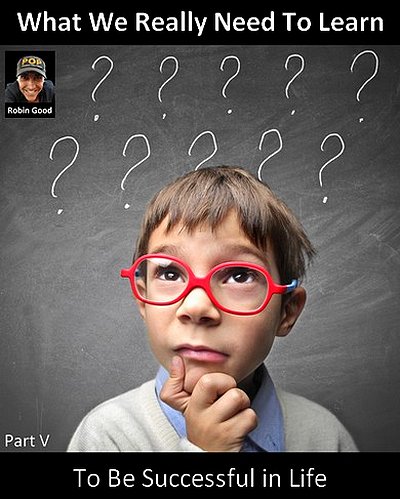
Photo credit: Child with question marks by Shutterstock
By posing myself this question over and over, and by questioning traditional curriculums and the real, practical usefulness of them in helping a human being survive and realize the dreams and ideas he conceives of, I have arrived at thirty-five key skills that I have listed in this multi-part guide. In this new and unique learning curriculum there is very little of what schools normally provide. Made exception for some basic math (though learned and understood with a completely different approach) and for dwelling deeper into truly understanding how to "read" something or knowing more about one's own body and physiology, the thirty-five skills that I have explored in this guide share very little similarities, if any, with those that you can gain in the 13 years of basic traditional school education. My key selection criteria in considering, evaluating and finally choosing anyone of the skills that I have here listed, has been a rather simple question: does the mastering of this skill significantly affect my probability to live a meaningful, constructive and rewarding life experience independently of the time, part of the world, social class, and group that one could be living in? And when my answer has been positive I have included that skill. Here the last five ones that I have selected:
31. How to Search32. How To Navigate 33. How To Calculate with Numbers 34. How To Rest 35. How To Cure Oneself
Here all the details:
31. How to Search
Definition:"To make a thorough examination of; look over carefully in order to find something."
Source: TheFreeDictionary
"To find something by looking or otherwise seeking carefully and thoroughly."
Source: Oxford Dictionaries
"The ability to look for, inspect, look, check and to question in order to find something."
"To be able to know where and how to look for things or information."
Source: Robin Good
Backgrounder:If you search online for "the value" or importance of knowing how to search and look for information or real things, you will have a very hard time finding anything useful or that even talks about this topic. Most of the information available online today relates to search engines and specifically to how to utilize them as marketing and advertising channels.
If you search for "how to search" you will not find much relevant information also, outside of tutorials on how to use Google and other major search engines.
In the first ten pages of Google search results I have not been able to find any up-to-date, reliable and informed content explaining in a comprehensive fashion how to search for anything, whether online or off.
The ability to look for, check, vet, filter and uncover rare, hidden or unknown things (whether physical objects or information) is of very high value as it can provide help, contribution if not
critical solutions to many human problems and needs.
It would seem as if historically search skills and abilities have been cultivated only by a restricted elite of investigators, writers, collectors, scientists and philosophers who have taken on personally their quest for finding answers to key questions and mysteries.
How-to:To develop good searching skills one must first develop an efficient questioning mind. That is to become very good at searching anything one must become very good at asking very good and relevant questions.
The better one is able to develop critical thinking and questioning skills that allow him to restrict and define what to search for and where, the more effective one becomes at searching and finding things.
Learning to play mind-games that involve thinking of and the use of questions to uncover a secret something can be particularly useful in this direction, as any other game that promotes the use of critical skills and questions.
Investigating a subject in-depth, by gathering as many facts and references as possible, from various sources and with different viewpoints, which need to be evaluated, verified and vetted helps in the development of valuable search skills. In this respect learning how to curate can
prove to be a very useful activity.
For these reasons learning how to do content curation can prove to be a very effective approach to learn just about any subject and to rapidly refine one's own searching skills.
Suggested Reading: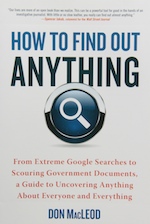 Book: How to Find Out Anything: From Extreme Google Searches to Scouring Government Documents, a Guide to Uncovering Anything About Everyone and Everything by Don MacLeod, 2012
Book: How to Find Out Anything: From Extreme Google Searches to Scouring Government Documents, a Guide to Uncovering Anything About Everyone and Everything by Don MacLeod, 2012
Tools & Resources:- NoodleTools - Best search solution for your information needs
32. How To Navigate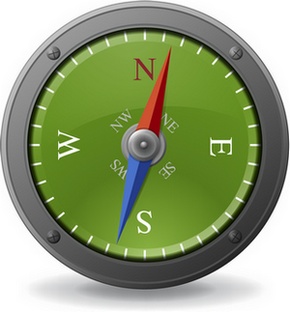
Definition:"To find the way to get to a place when you are traveling."
Latin navigatus, past participle of navigare, from navis ship + -igare
Source: Merriam-Webster
"To direct (oneself, one's way, etc) carefully or safely."
"To plan, record, and control the course and position of."
Source: TheFreeDictionary
"To plan your course or to steer, guide or move through something."
Source: YourDictionary
"The faculty of knowing where you are in relationship to where you are headed. ...the activity of making your way towards a destination."
Source: FindMehere
"The ability to assess position, identify viable routes and select the most effective one
to reach a specific destination."
Source: Robin Good
Backgrounder:"When you draw out a route to take on a map, this is an example of a time when you navigate.
When you steer and guide a ship to its destination, this is an example of a time when you navigate. When you move through a crowd carefully, this is an example of a time when you navigate the crowd."
Source: YourDictionary
Information is everywhere, but having access to it does not mean knowing how to find, evaluate and use that information effectively.
Navigating physical or information spaces is a required activity to move from anyone place to a new one. The difference between moving and navigating, consists in the fact that navigation is a more complex skill than moving, as it requires the ability to first understand where one is positioned, and then to identify and plot the best route and means to reach a new destination.
Moving is simply about the displacement of a person or object from a place to another one, assuming both are in clear view of each other and there are no obstacles or resistance between them.
To navigate is a very valuable skill both for anyone working inside information spaces like the Web as well as for anyone who needs to drive, sail, fly or move transportation vehicles of any kind from one place to another in absence of clear route indications as well as under unpredictable, confusing and emergency conditions.
"Navigating includes constantly determining present position and location while being alert to distance traveled as well as that yet to be traveled.
To navigate refers to following a planned course through an environment while being alert and coping with obstructions."
Source: FindMeHere
How-to:To effectively navigate any space or distance it is of the essence to develop the ability to easily assess present position as well as final destination. The better one can assess and define these two elements, the easier it becomes to move between them.
The more fuzzy, out of focus or not clearly defined any of these two references the harder, more time consuming and difficult (uncertain) it becomes to navigate between them.
In this light, the skills, activities and exercises that can help most anyone wanting to become a better navigator are:
- Creating maps, and knowing how to read them
- Assessing position objectively; knowing how to use compass, GPS and any other technology capable of assessing your present position in a physical or information space
- Familiarity with different ways and options available to move from one place to a different one
- Ability to rapidly evaluate pros and cons of different routes
- Crap detection - knowing how to identify unreliable or misleading info
- Pattern recognition - being able to recognize rapidly similar patterns and situations to anticipate, predict or adopt appropriate solutions
- Opening all your senses to the information around you - this means that you need to develop and refine the skills of being able to sense, note, capture and interpret many different signals that can help you better assess position and navigation options
- Opening your mind to understanding available information in new ways - the ability to interpret information from multiple viewpoints or perspectives
- Knowing how to tell the forest from the trees - having the ability to see both the full picture / map / puzzle as well as the individual pieces making it up
- Getting a bird's eye view of your position - knowing how to see your present position in relationship to other elements, and to the larger picture in which you are not anymore the center of your view
- Confronting and interacting with the information you have - having the ability to manipulate, compare, analyze, transform, vet and distil the information bits at our disposal
- Visualizing data and information at your disposal - knowing how to convert numerical and statistical data into maps, images that can augment our ability to see through them
Suggested Reading / Videos:
Video: Instant Expert: How to Navigate Without a Compass, by Paul Hart
Duration: 03':50"
33. How To Calculate with Numbers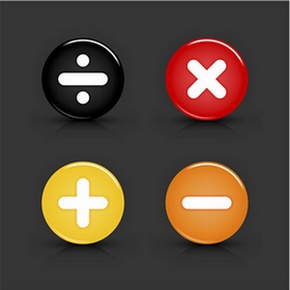
Definition:"The study of quantity, especially as the result of operations that combine numbers."
Source: Wikipedia
"The science of using numbers to calculate."
Source: Robin Good
Backgrounder:Knowing how to use numbers to calculate the probabilities of something as the cost of an investment you have to make, or to establish how much time is left before you arrive at a location, are just a fraction of the hundreds of situations one encounters daily in which having the ability to do basic calculations with numbers can prove to be very useful.
Here a few important human activities that benefit immediately when there is someone around who can calculate with numbers easily:
- Buying and selling your products and services
- Travelling and calculating travel and arrival times
- Administering your personal accounts and expenses
- Financing your next car
- Billing the work you have done for a new customer
- Planning your time
- Navigating at sea or on a map
- Estimating the cost of building something
- Evaluating different alternatives based on numerical criteria
- Training in a systematic way
- Buying and selling your products and services
- Architecture
- Engineering
- Coding - Programming
- Makers - Creators
- Creative artists (painters, sculptors, filmmakers, editors)
How-to:The best and most effective way to learn how to calculate with numbers is to play with numbers.
The more you get accustomed and familiar with ways to calculate how to win, how to score or keep tabs on other players, the better skilled you can get at using numbers effectively.
There are literally hundreds of physical, mental and digital games designed specifically to help people become familiar with numbers and arithmetic, as well as many simple techniques that can simplify a great deal the memorization of relevant patterns and formulas needed to rapidly calculate even without pen and paper.
Traditional social games like many of those based on cards can provide some fun way to practice and use basic calculation techniques easily and in ways that provide an immediate reward.
Another important consideration to be made when trying to learn math outside of a traditional academic environment is the need to understand both the "how" of calculation as well as the "why" it works.
Without full understanding of both "how" and "why" it is much more difficult to retain and store in long-term memory any new learning.
Suggested Reading / Videos:
Video: Teaching Math without Words by Matthew Peterson
Duration: 8':17"
Tools & Resources:- e-Learning for Kinds - Math - Available in 5 different languages this is one of the best and most comprehensive resources where to find excellent games to learn to play with numbers.
- Math Playground - Play with math and give your brain a workout. Dive into the fun side of math with thinking games, number puzzles, and more.
- Motion Math Games - Fun learning games that let kids play with numbers. Grounded in educational research, Motion Math's games fuse fun and learning.
- TopMarks Math Learning Games - A curated resource to help you find the best and most reliable educational resources online.
- Math Card War - Let's Play Math, 2006
34. How To Rest
Definition:"To be at peace or ease; be tranquil"
"To be, become, or remain temporarily still, quiet, or inactive"
"To refresh oneself, as by sleeping, lying down, or relaxing"
Source: FreeDictionary
Backgrounder:"People actually accomplish more when they take time for short rests"
Source: FreeDictionary
Sleep and good rest are very important for the well being of a person because they help your brain and nervous system prepare for the next day challenges, as well as creating new pathways and neural connections which help you learn from information and experiences you have gathered from the outside world.
Research shows that people who get good rest can learn better and faster than those who don't.
On the other hand, people who rest little, do not sleep enough or have sleep deficiencies of some kind may have more problems taking decisions, solving problems, being able to control their emotions and coping with changes around them.
See: Why Is Sleep Important? - National Insitutes of Health
Not only. Lack of good rest can also negatively influence your social relationships, as people who lack sufficient rest are often angry and impulsive, can be subject to fast mood swings, may easily feel sad or depressed or demotivated.
Another key symptom of lack of sufficient rest is the limited ability to focus, concentrate and specifically to pay sustained undivided attention to something.
Last but not least, lack of good rest can result in specific physical consequences such as increased risks for your heart and blood vessels as well a much increased risk of getting obese.
See also: Importance of Sleep : Six reasons not to scrimp on sleep - Harvard, 2006
"Contrary to common myth, the need for sleep doesn't decline with age but the ability to sleep for six to eight hours at one time may be reduced."
Source: Principles & Practice of Sleep Medicine by Van Dongen & Dinges, 2000
"Groups that are at particular risk for sleep deprivation include night shift workers, physicians (average sleep = 6.5 hours a day; residents = 5 hours a day), truck drivers, parents and teenagers."
Source: American Academy of Sleep Medicine and National Heart, Lung, and Blood Institute Working Group on Problem Sleepiness, 1997
How-to:To rest effectively it is not just about deciding to rest, as our bodies and mind are not generally trained and skilled to go into rest-mode at command.
A number of elements need to be taken into consideration and addressed, in order to create the right physical, mental and environmental conditions for your body and mind to actually rest themselves. These elements include:
- Stress reduction.
The less stressed you are the easier and faster you can get to rest and to recover new energies.
- Exercise physically.
The more you exercise and use your body in non-harmful physical activities, the easier it is to put it into rest mode.
- Go to sleep before midnight.
Sleeping early rather than more, has often tangible benefits.
- Do not eat a large meal before going to rest.
If your body is busy digesting something your rest may not be as good.
- Stay clear of resting places where your rest can be easily and repeatedly interrupted.
Rest does not long periods of time, but it does need to have a quiet environment to do work effectively.
- Sleeping setup.
Give appropriate consideration to the place, position, and materials on which you intend to rest as they all have an influence on the quality of your rest.
- Sleeping partner.
Avoid sleeping next to a person that is not quite and relaxed during rest. His/her restlessness will affect your rest as well.
- Avoid night-shift jobs.
Training body and mind to stay up during night time for extended periods of time deprives body-mind from appropriate rest and recharging no matter how much time you sleep during the day.
- Alcohol and coffee drinking in afternoon or evening.
Stimulants do just that: stimulate your brain and nervous system to stay awake, ready and alert. When you want to rest deeply, you really don't need those substances in your bloodstream.
- Avoid intense exercise or mental activities before sleeping.
Body and mind want to do things. So when you solicit them intensely into high-energy activities you will then need to provide extra time for them to return to a relaxed and restful state.
- Keep a regular sleep/wake schedule.
Develop a regular bed time and go to bed at the same time each night.
Discipline and consistency helps your body maintain and autoregulate its needs and requirements for recharging more easily.
Suggested Reading / Videos:
Video: How to succeed? Get More Sleep by Arianna Huffington
Tools & Resources:
35. How To Cure Oneself
Definition:"The act of making someone healthy again after an illness."
"To restore to health, to bring about recovery."
Source: Merriam Webster
"To be able to cure oneself from illnesses and diseases without needing to go to a doctor and without having to take pharmaceutical products"
Source: Robin Good
Backgrounder:Before the 20th century most human beings had lots of personal knowledge about how to keep themselves healthy and about how to cure themselves in natural ways (as pharmaceutical solutions were not available at the time). Nonetheless humans had a much shorter life span, they were able to keep at bay, cure and protect themselves from most of the non-lethal illnesses and diseases.
Given the uncertainty of the future and of healthcare services in years to come, and considering the many risks associated with a blinded dependence on a for-profit institution, the pharma industry, which is clearly more interested in revenues that in its patients health, it would be much better for those interested in having greater control of their life expectancy, to invest in getting to know more about how their bodies function and in re-acquiring traditional knowledge about health and natural remedies.
"99% of all drugs are worthless because they don't fix anything;
they only suppress the symptoms."
"Just like using a piece of chewing gum to blank out the oil warning light on your car dashboard. The symptom (the red light) goes away. But the problem sure as heck doesn't."
Source: How To Cure Yourself Of Any Disease... by Keith Scott-Mumby
How-to:The best thing one can do to learn how to cure oneself and prevent diseases is to get to know more about how his / her body works.
The more you know about the human body, its specs, features and requirements, the better equipped you are in understanding and finding natural ways to prevent and resolve non-life critical illnesses.
To learn about your body and how it works there are literally hundreds of quality resources ranging from web sites, to videos, books and seminars where it is possible to dive and learn everything that you ever wanted to know.
You just need not wait for this information to arrive to you at some point in your life, because it won't. Too much money, organizations and people are at work everyday to make it more and more difficult for you to discover, access and learn about these alternative approaches and methods as they would positively dent their multi-billion dollar interest in health as a business industry.
This is why to learn to cure oneself without medicines and without doctors, a fast approach is to travel and to go to live for some period of time in a place where there are no doctors and no hospitals and to see and experience firsthand how humans in these situations can still live a very healthy life and how they cope and contrast typical health problems that all humans have.
In your path toward becoming more and more aware of how your body works and more capable of knowing what to do to assist it and support it in its recovery, two assumptions that can make a significant difference are these:
- Natural recovery is built-in. Make sure it can work.
Your body always knows and it has its own means how to recover from any illness, diseases or non-critical accident. You only need to help the body do its own recovery course by taking away anything that could slow it down or impair it.
- Don't poison in the name of...
Your body is weakened and loses a bit of its capacity to recover form anything, anytime you poison it. This is why you must be very careful in not poisoning yourself in any way in order to / or with the justification that, you are trying to restore health. If you do, you may resolve one thing yes, but the price you pay for having done so, is generally much bigger and more difficult to resolve than letting your body do its own work.
Suggested Reading and Videos: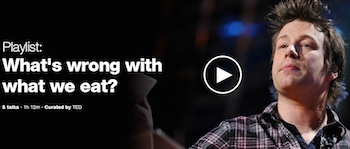 Video: What's wrong with what we eat? - TED video playlist
Duration: 1h:12' (5 videos)
Video: What's wrong with what we eat? - TED video playlist
Duration: 1h:12' (5 videos)
End of Part V
See Part I: What We Really Need To Learn To Be Successful In Life - Part I
And Part II: What You Really Need To Learn To Be Successful In Life - Part II
And Part III: What You Really Need To Learn To Be Successful In Life - Part III
And Part IV: What You Really Need To Learn To Be Successful In Life - Part IV
Originally written and curated by Robin Good and first published on MasterNewMedia on Tuesday June 3th 2014 as What We Really Need To Learn To Be Successful In Life - Part V.
Photo credits:How to Search - Magnifying glass icon by ShutterstockHow To Navigate - Vector compass illustration by ShutterstockHow To Calculate with Numbers - Math symbols by ShutterstockHow To Rest - Man Relaxing by ShutterstockHow To Cure Oneself - Herbal tea by Shutterstock
-
What You Really Need To Learn To Be Successful In Life - Part IV
What are the key skills to be learned to live a successful life? If schools as we know them, were not there, what would I consider top critical skills to be learned for my kids? 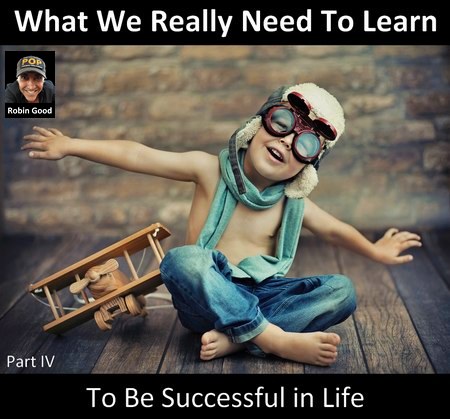
Photo credit: Boy playing by Shutterstock
In the previous parts of this guide I have expanded on Stephen Downes original 10 points included in his excellent guide "How To Be Successful", which I curated and republished (with his permission) in 2006. In Part II and III I have looked at 15 additional skills, ranging from the social (collaboration, sharing, listening, being sociable), to the survival (grow your own food, wilderness, first aid, personal defense) and to the cognitive / intellectual ones (how to ask good questions, how to curate, how to focus, and more). In Part IV I am looking at the following five additional life critical skills:
26. How to Get Buy-In
How to get other people to support you and your initiatives27. How to Sell
How to sell things in exchange for money to other people 28. How to Be Reputable
How to leverage reputation without handicapping yourself uselessly? 29. How to Be Causative
How to effectively change things? 30. How To Be In The "Here and Now"
How to be fully in the present moment and why this is so important
Here all the details:
26. How to Get Buy-In
Definition:"Acceptance of and willingness to actively support and participate in something."
Source: Merriam-Webster
"Getting agreement, approval and support from others to do something."
"Getting advocates for your cause, proposal, idea."
Source: Robin Good
"The commitment of interested or affected parties to a decision (often called stakeholders) to 'buy into' the decision, that is, to agree to give it support, often by having been involved in its formulation."
Source: Wikipedia
Backgrounder:Buy-in occurs when an individual sees clearly that all of his needs, interests, desires and fears have been fully taken into account.
Buy-in also occurs when a person feels integral part of the group and of the decision-making process where he is asked to provide support.
The tangible benefit of buy-in is the fact that whoever buys in will also feel responsible for whatever is being created or produced. People who have seriously bought-in into an idea will naturally brag about it, will share the idea with others and will try to find ways to make it better.
In other words people who buy-in into something will become natural evangelists for that idea / project.
Furthermore, a group of people who has bought in into a project or idea is generally excited about it and will do whatever in its capabilities to make it succeed, including being much more flexible and willing to adapt to the needs and requirements of the project. In practical terms these people will find extra time to go through the actual changes needed to achieve the goal they have bought in, even if these require them to learn new stuff, change habits and approach certain things in novel and unfamiliar ways.
Buy-in can happen as long as the people asked to contribute and support can clearly a see a tangible benefit in their lives for taking this course of action.
The key reasons why it is generally quite difficult to get others to buy-in into your project include feelings such as:
- being excluded
- not being valued properly
- not having one's own interests taken seriously into account
- fear of being exploited
- lack of detailed information
- not enough transparency
- having one's opinion not seriously considered
- inability to understand fully the plan / strategy
- things moving too quickly
- lack of affinity with other stakeholders
- lack of clear motivations for proposed action
- lack of clear benefits and rewards
How-to:Inviting teammates, stakeholders, readers or fans to provide feedback, criticize or contribute to your work can be very beneficial, as these people can see your project from different and complementary viewpoints, and this can help you refine and hone your approach while getting them to feel tangible ownership of the project.
To get buy-in from other people the first and foremost thing to do is to inform them in a clear fashion that allows them to identify, empathize and fully understand:
a) the issue at stake,
b) the consequences of not addressing it, and
c) the motives and benefits of working together to solve it.
The best course of action for anyone wanting to get more buy-in (active support) from others should include as many of the following action-points as possible:
- Reach out to, re-unite, get together all who are or may be affected.
- Ask about their feelings, fears, gather opinions and sensations on the issue at hand.
- Identify exactly what problems they have. Assess the current situation.
- Involve them in looking and suggesting possible alternative solutions.
- Highlight the real, tangible and personal consequences that the issue / problem at hand can have on them if not properly solved.
- Acknowledge and publicly describe all of the risks and issues that the project may run into.
- Anticipate all possible arguments, questions and skepticism and prepare high quality answers and fact-rich replies to address them.
- Address and answer all possible doubts, questions and prejudices.
- Clearly illustrate and explain why your solution / proposal is good.
- Clarify what's in it for you. Why you do it, what you are going to get out of it.
- Compare and confront your proposal / solution to what others have done before or to other possible approaches.
- Make your proposed solution feel as real as possible. If it doesn't feel real, it will not be easy to get buy-in.
- Help yourself by using analogies or storytelling to emotionally convey and share the story and motives behind your project / idea.
- Leverage the power of social media to reach and find more people interested in supporting and helping your idea / project grow.
- Explain clearly how everyone can get involved and how he will be rewarded.
Suggested Reading and Videos:
Video: How Great Leaders Inspire Action by Simon Sinek
Duration: 18':01"
- Article: Before You Can Get Buy-In, People Need to Feel the Problem by John Kotter, 2011 - Harvard Business Review
- Article: Getting Others to Support Your Ideas by Marcia Pennington Shannon, 2007 - AmericanBar
- Book: Start with Why: How Great Leaders Inspire Everyone to Take Action by Simon Sinek, 2011
- Book: Buy-In: Saving Your Good Idea from Getting Shot Down by John Kotter, 2010
- Book: The Layers of Resistance -- The Buy-In Process by Efrat Goldratt-Ashlag, 2010
- Book: How to Get People to Do Stuff: Master the art and science of persuasion and motivation by Susan Weinschenk, 2013
- Book: Advocacy: Championing Ideas and Influencing Others by John Daily, 2011
- Book: Influence: The Psychology of Persuasion by Robert Cialdini, 2009
- Book: Getting to Yes: Negotiation Skills & Strategies by Katie Lenhart, 2013
- Book: Made to Stick - Why Some Ideas Survive and Others Die Hardcover by Chip and Dan Heath, 2007
Tools & Resources:
27. How to Sell
Definition:"The holistic business system required to effectively develop, manage, enable, and execute a mutually beneficial, interpersonal exchange of goods and/or services for equitable value."
Source: ASTD
"Selling is offering to exchange an item of value for a different item."
"a systematic process of repetitive and measurable milestones, by which a salesman relates his or her offering of a product or service in return enabling the buyer to achieve their goal in an economic way.."
Source: Wikipedia
"People don't buy what you do; they buy why you do it. And what you do simply proves what you believe."
Source: Simone Sinek
Backgrounder:Selling is a life critical skill because, everyone needs at some point or another in his life to be able to sell his idea, property or car to someone else.
Famous author, Robert Louis Stevenson, recognized this when he said, "Everyone lives by selling something".
Whatever is your profession, interest or passion in life, sales skills can be very valuable, as they allow you to:
- Persuade others of the true value of something good you have/own
- Raise money rapidly in case of need
- Be able to face sudden economic downturns
- Convince others of your ideas
- Bail out of difficult situation by bargaining a way out of it
- Sell to others what you want
Selling is a particularly vital activity when it comes to buy, exchange or barter assets or services you need.
Sales are important as they allow any individual, company or organization to obtain money or other goods in exchange for whatever they produce, create and offer for sale. This in turn allows the individual, company or organization to continue its activity, pay collaborators and contributors, invest in new possible directions and to improve its line of products / services.
Selling is a very close relative to "How to Get Buy In".
How-to:According toWikipedia: "The personal selling process is an eight step approach that has been found to be beneficial in sales. The eight steps are: prospecting, preapproach, approach, need assessment, presentation, meeting objections, gaining commitment, and following up".
You can indeed use these eight references as reminders of what a classical salesman would likely do in the real physical world.
To sell effectively you must know very well the product that you are selling, and you must develop the communication skills required to illustrate and explain clearly its benefits and its relevance to your potential customers.
Key actions that significantly help the selling process are:
- Listening, or the ability to truly understand what the customer needs and wants.
- Sharing, informing in an empathic, simple and straightforward fashion.
- Identifying pain points, specific needs that your potential customer may have, often by
asking specific questions.
- Handling objections or being prepared to answer, clarify and explain any kind of doubt, problem or issue presented by a potential buyer.
Suggested Reading and Videos:
Video: Why To Sell Is Human by Dan Pink interviewed by KnowledgeWharton
Duration: 20':28"
- Article: How To Be Great At Selling Even If You Hate It by Ira Kalb, 2013 - Business Insider
- Article: Steps to Selling, 2013 - Australia Business & Industry Portal
- Book: To Sell Is Human: The Surprising Truth About Moving Others by Daniel Pink, 2013
- Book: Selling with Integrity: Reinventing Sales Through Collaboration, Respect, and Serving by Drew Morgen, 1999
- Book: How to Sell Anything to Anybody by Joe Girard, 1978
- Book: Endless Referrals by Bob Burg, 2005
- Book: Selling 101: What Every Successful Sales Professional Needs to Know by Zig Ziglar, 2003
- Book: How To Sell When Nobody's Buying by Dave Lakhani, 2009
- Book: The Boron Letters, Gary Halbert, 2013
28. How to Be Reputable
Definition:"Having a good reputation; respected and trusted by most people."
Source: Robin Good
Reputation:
"Reputation is a perception of value or distinctiveness vis-a-vis peers and competitors"
Source: Drexel.edu
"What others say about you and what level of esteem they have for what you do."
Source: Robin Good
"The collective mental construct everyone but you shares about you, a construct based partially on your own actions but also on the perceptions others have about others' perceptions of your actions."
Source: Alex Lickerman
"The beliefs or opinions that are generally held about someone or something."
Source: Merriam Webster
Backgrounder:"Some may think reputation doesn't matter or shouldn't matter, that we should all focus on doing our best, on being our best, and let others think what they may. Certainly, I agree we should never seek to manipulate what others think about us (it never works in the long run anyway), but to ignore the practical importance of a good reputation cheats us of many opportunities we might otherwise enjoy.
Caring about our reputation doesn't mean we need others to like us. It means recognizing that as human beings we often can't help judging a book by its cover and that as long as the book itself is good there's nothing wrong with caring about having an attractive cover around it."
"A good reputation shouldn't be an end in itself but rather a natural outgrowth of your striving to be the person you most want to be."
Source: The Value Of A Good Reputation by Alex Lickerman, April 2010 - PsychologyToday
Contrary to popular opinion, reputation is OK, but it should not be attributed extraordinary powers it does not really possess.
"Our reputation represents the way others look at us and as such is at once critically important and utterly trivial.
Utterly trivial because if we have a healthy self-esteem we won't need others to think well of us (though many of course do struggle with this and often find their sense of value vulnerable to the opinions of others--especially their perception of the collective opinions of others).
Critically important, however, because even those of us with resilient self-esteem live in a great social network and need a good reputation for practical purposes--friendship and income chief among them. It's hard to have friends if people think you're mean-spirited and hard to make a living in any capacity if people think you're lazy, unreliable, or dishonest.
Our reputation is a tool, then--not, hopefully, for creating or maintaining our self-esteem but for practical navigation through daily life..."
Source: The Value Of A Good Reputation by Alex Lickerman, April 2010 - PsychologyToday
Reputation can greatly help (especially in the online world), where there is a large need to:
a) rapidly assess the value, reliability and trustworthiness of a person / company / service, or to
b) distinguish yourself from others, by providing potential clients and customers with additional information clues about your credibility, and
c) improve the perceived value and attractiveness of your persona or of whatever product or service you sell.
But as you may have already heard: It may take a lifetime to build a good reputation for oneself, but only a few seconds to lose it all.
All it takes to lose one's own reputation is to suddenly fail to match even one of the ethical, moral or social principles around which you have built your credibility or to fall victim of other people's decision to discredit you and your reputation by spreading false and misleading information.
A person's reputation can be easily destroyed, influenced or heavily manipulated by outsiders and therefore it cannot be considered, per se, a reliable and absolute indicator of trustworthiness and reliability of anyone.
For this reason, overly worrying about reputation is not a good idea as it may force a person to act and behave not always in his best interest, but in the interest of the image of himself that he wants people to hold or believe in.
Being too fanatical about one's own reputation can also limit a man's potential to experiment, explore or try out different routes to achieve his objectives as he may be afraid to lose his reputation by doing so.
An individual should also be capable of taking, when needed, unorthodox, unpopular and unusual actions to achieve his goals without having to worry about his reputation being handicapped by this choice.
How-to:First thing to remember is: If you don't manage your reputation, someone else will do it for you.
Be it journalists, critics, bloggers, competitors or partners, if you don't take pro-active action to share a public image of yourself, one of these people will do it for you.
"Character is who we are and what we value.
Communication is how we share our thoughts and values, engage and learn from others, and reach out to help in any way we can.
Character, followed by Communication, leads to Trust, which generates the support and allegiance that lead to a positive reputation.
Trust is the direct result of who we actually are and how we actually behave. This connection - from Character, to Communication, to Trust, to Reputation - is the path to follow in developing a positive reputation for yourself."
Source: The Power of Reputation: Strengthen the Asset That Will Make or Break Your Career by Chris Komisarjevsky, 2012
To improve your reputation you need to:
- "Become a person who deserves one.
- Take consistent action that embodies the characteristics you want others to associate with you.
- Don't just mouth the platitudes of hard work, attention to detail, loyalty, and drive -- live them. In fact, don't mouth them at all. Let others discover them in you."
Source: The Value Of A Good Reputation by Alex Lickerman, April 2010 - PsychologyToday
In my personal experience the key factor that contributes the most in the development of one's own reputation is consistency / coherence: do you do what you say you will do? Do you stand by your promises? Do you walk your talk?
In the online world, where you often need to assess and evaluate a person's reliability and trustworthiness there are a number of specific factors that an increasing number of people use to evaluate/influence someone else's reputation. These may include your:
- Work experience - what you have created, built
- Writing and published work(s) - articles, ebooks, magazines, print books, etc.
- Experience: how long you have been doing what you do
- Past education: what you have studied and where
- Online presence: your professional presence on the web (your personal site, your social media presence, Email signature, About page
- Public achievements: awards, prizes you have won
- Testimonials, mentions and citations about you + who talks about and links to you
- Numerical indicators such as visibility, traffic, number of followers, inbound links, views, etc.
Suggested Reading / Videos: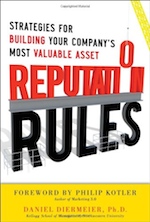 Book: Reputation Rules: Strategies for Building Your Company's Most Valuable Asset by Daniel Diermeier, 2011
Book: Reputation Rules: Strategies for Building Your Company's Most Valuable Asset by Daniel Diermeier, 2011
Tools & Resources:
29. How to Be Causative (able to bring about change)
Definition:"Effective in bringing about change"
"Effective or operating as a cause or agent"
Source: Merriam-Webster
"To act aware of the fact that you are responsible for everything that happens around you"
Source: Robin Good
Backgrounder:In life it is important to be "causative", that is, effective in bringing about the desired change in whichever field. Not being able to "cause" change, means surrendering direction and change to whoever else will take responsibility for it.
You can choose to see and act with the assumption that there are magic coincidences or accidents: but in reality what happens to you, where you are, who you are with, are all consequences of the personal choices you have made earlier. If you can embrace this concept you can then decide to act with a different awareness as you start to own the consequences of your choices.
You are always, whether you like it or not, in the driver's seat. This is why, if you are not the cause of something, you are likely going to be the effect of it.
By choosing to be causative, able to effect change, you will start to see opportunities in what others would normally consider negative circumstances.
Being causative allows you to create, produce, make things. If you become fully aware of this ability you have, you also realize that what you can imagine, you can also create.
Knowing how to change things allows you to be fearless as you know that you can handle any situation and overcome any obstacle; it is just a question of doing it.
By being causative you don't get hung up in doubts and fears/problems, you act instead of procrastinating.
How-to:- Be present - be in the present time, in the "here and now"
- Know that in any troublesome situation you can do something about it
- Be confident / trust in your capabilities
- Be resourceful - do what the hell needs to be done, and utilize all of the connections, tools, that you have at your disposal
- Keep the focus on getting results
- Be decisive - take decisions and act quickly and effectively
- Be prepared to take full responsibility for the consequences of your actions
- Originate - be the starter - the dj - conjure up something - do things
- Don't follow - don't default back on what everybody thinks or does -
- Evaluate the situation and make up your own mind
Suggested Reading / Videos: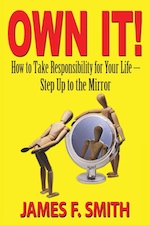 Book: Own It! How to Take Responsibility for Your Life - Step Up to the Mirror by James Smith, 2013
Book: Own It! How to Take Responsibility for Your Life - Step Up to the Mirror by James Smith, 2013
30) How To Be In The "Here and Now"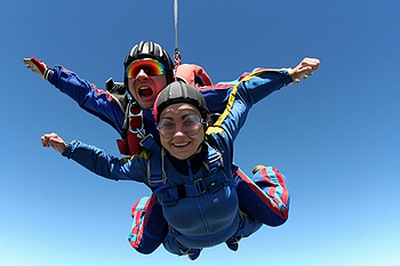
Definition:"To be fully present and fully aware in the present moment."
Source: Robin Good
"Being mindful."
"Being in the moment, being in your body; not being on 'autopilot"
Source: SmartRecovery
"To set the intention of paying attention to what's happening at the present moment."
Source: Psychology Today
Backgrounder:a) You are talking to someone, but you can clearly perceive that the other person "is not there" and is not listening to what you are saying.
b) You are driving a car but your mind is wandering elsewhere, and not paying close attention to the road, to other vehicles and to possible risks. In fact you miss altogether your freeway exit and you wonder where you were when that happened.
c) You are reading a book and you suddenly realize you have no memory or awareness what you have just read for the last fifteen minutes.
In these three cases you have a perfect picture of what it means not to be in the "here and now", and you can also understand why it is a life critical skill as it not only allows you to live life fully in the most literal sense, but it also allows you to appreciate life more and in greater detail, and to avoid placing your life and the one of others in danger.
Being here and now, or being "mindful", contributes to a richer, fuller life because you are noticing all the things around you (e.g., you aren't eating an entire meal without tasting it).
Being in the "here and now" happens when you're so engrossed in a task that you lose track of everything else around you. The depth of engagement absorbs you powerfully, keeping attention so focused that distractions cannot penetrate. You focus so intensely on what you're doing that you're unaware of the passage of time.
How-to:To be in the here and now requires that you temporarily put aside all worries, fears and thoughts about the past and the future. By doing this you liberate yourself from carrying in your head a weight that is not needed right now and which may hamper your desire to create, make or do something specific.
Here's some basic advice on how to work toward being more often in the "here and now".
- Alleviate stress.
Reduce as much as possible stress, pressure and any other factor that holds part of your attention.
- Realize that you are not your thoughts.
Recognize and become aware of this powerful fact. You can watch your thoughts without needing to identify with them.
- Meditate.
Exercise yourself to focus and to be fully in the here and now by learning the practice of meditation. The purpose of this activity is to quiet the ongoing chatter in your mind and to focus only on one thing.
- Start paying attention again.
Make an effort to pay close, active, undivided attention to your present activity, without letting yourself get engaged, interested or distracted by other things.
- Breathe.
Learn how to become aware of your breathing patterns and how to focus rapidly by paying specific attention to it.
- Take it easy.
To be able to be fully in the "here and now" you must literally abandon or give up thinking about what happened or is going to happen next, while focusing only on this very instant.
- Focus on things outside of you.
Pay attention to a bird, a kid playing, a flower. The less you think and the more you put your attention to something specific, the more you will be in the present moment.
- Act.
Do things, instead of thinking about doing them or about the issues that prevent you from doing them.
- Don't judge.
Exercise yourself in suspending judgement when you want to increase your ability to be in the present moment. Judging and evaluating involves a lot of thinking, while being present requires as little thinking as possible.
- Do one thing at a time.
Don't get sold on the idea that nowadays the good guys are those who can multitask. Not true. To do things better and faster, go after the big fish first, and do one thing at a time.
- Do not react / Don't get sucked in.
Maintain your independent viewpoint. Don't fall prey of anything that attempts to provoke you or change your focus by leveraging your emotions.
- Practice being curious.
Engage with things as if it was for the very first time. Start paying attention again to things, even to the ones you think you already know.
And to be in the "here and now", as with romance or sleep, you can't just will yourself into it - all you can do is set the stage and to create the optimal conditions for things to occur.
Suggested Reading / Videos:
Video: Here and Now by Alan Watts
Duration: 7':34"
Tools & Resources:
End of Part IV
See Part I: What We Really Need To Learn To Be Successful In Life - Part I
And Part II: What You Really Need To Learn To Be Successful In Life - Part II
And Part III: What You Really Need To Learn To Be Successful In Life - Part III
And Part V: What You Really Need To Learn To Be Successful In Life - Part V
Originally written and curated by Robin Good and first published on MasterNewMedia on Tuesday May 20th 2014 as What We Really Need To Learn To Be Successful In Life - Part IV.
Photo credits:How to Get Buy-In - Thumbs up by ShutterstockHow to Sell - Woman doing shopping by ShutterstockHow to Be Reputable - Quality stamp by ShutterstockHow to Be Causative - Inspiration by ShutterstockHow To Be In The "Here and Now" - Skydiving by Shutterstock
-
What You Really Need To Learn To Be Successful In Life - Part III
Which are the critical life skills one really needs to learn to be able to live a successful and meaningful life? 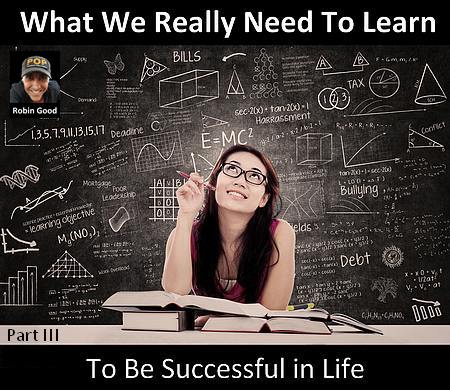
Photo credit: College female student by Shutterstock
Trying to answer this question has been the key driver of this multi-part guide designed to question our conservative assumption about what schooling should really be about and to explore the skills that, if mastered early in life, could truly make a big difference in how we could live it thereafter. In Part III of this guide to what you really need to learn to be successful in life, I have moved on to explore those that I would label "social" critical skills. These are vital skills needed to interact, collaborate, help and get things done together with other human beings. I have decided to include only five skills/sections inside this and the next upcoming Parts of this guide, as in the two preceding ones Part I - Part II I realized that I do prefer to go more for quality than for quantity, and prefer therefore to limit the number of skills I cover in each part so that I can curate them better by devoting to them more attention and time. In this Part III, I have included the following new life critical skills:
21. How to Recognize Negative People22. How to Collaborate / Cooperate 23. How to Share 24. How to Be Social 25. How To Listen
Here all the details:
21) How to Recognize Negative People
Definition:"the ability to rapidly identify individuals that have a high potential of negatively influencing you and your life."
Source: Robin Good
"knowing how to recognize and stay clear of troublesome people."
Source: Robin Good
Backgrounder:Negative people are the most destructive, negative force you can find during the course of your lifetime.
Living or being physically nearby negative people can be a very destructive experience that can permanently limit your abilities to think clearly, to be motivated, to be calm and rational and even to recover from physical illnesses.
Negative people do not present themselves with the typical traits of a destructive or negative person but instead they are very skilled in appearing as people who appear to love who you are, what you do and who apparently want to be close to you in your journey toward success.
In reality these people share very little affinity and intellectual abilities with you and are there only to lure you into accepting them into your close circle of friends, so that they can do even more damage to you.
Negative people most typical tactics are to slowly and unsuspectedly bring in confusion, false alarms, as well as to discredit you and other good people in public, to slow down good, beneficial initiatives, to dump down new promising projects and to systematically break good communications by introducing conflicting, misleading or irrelevant stuff. The greatest skill they have is that they can do all of this without ever appearing as being your enemies.
How-to:To identify negative people from which you should steer away instantly, is not too difficult.
Here a few simple rules I have learned in my life that have helped me greatly in avoiding negative, destructive people. Here's what I suggest you to keep under check:
- Their response reaction time. Do they reply promptly to your questions or are there long silences or pauses before they answer back?
- Whether they go straight to the point, or they start running in circles around it, while often taking side tracks and de-tours from the topic at hand.
- Their ability to be precise and to respect appointments, agreements, and the like without coming up with last minute surprises and justifications.
- How much they are complaining, lamenting and talking negatively about other things vs. how much they spend talking about desirable, positive and admirable things.
- Their responsibility awareness level. Are they taking responsibility for the situation around them and for the negative aspects of it, or are they always blaming external factors and circumstances?
- When they get into an accident who do they blame? Do they take responsibility for their action or they blame always some external force? Do they play constantly the victim game or do they take responsibility for what happens to them?
- What have they built? Created? Brought to conclusion with success? What are the great things they have done so far in their lives?
- What do they really know about you and about your ethics, goals and mission? Are they curious to discover them or does it appear as if they had always known them?
- How much do they encourage and support your efforts, good work and achievements? Do they understand what you are really doing? How do they contribute to help you succeed?
- Can they have a deep and open intellectual discourse with you or are they are at much higher ease in talking about light issues, gossiping and generalizing what happens around them?
Suggested Reading: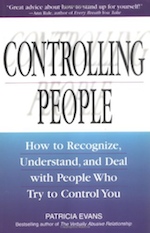 Book: Controlling People: How to Recognize, Understand, and Deal with People Who Try to Control You by Patricia Evans, 2003
Book: Controlling People: How to Recognize, Understand, and Deal with People Who Try to Control You by Patricia Evans, 2003
22. How to Collaborate / Cooperate
Definition:
"Working together to create value while sharing virtual and physical space."
Source: Evan Rosen
"Working together while seeking a common goal."
Source: Robin Good
"Collaboration: an act or instance of working or acting together for a common purpose or benefit; joint action."
Source: Dictionary Reference
"Cooperation: To work or act together toward a common end or purpose."
Source: The FreeDictionary
"Cooperation: Voluntary arrangement in which two or more entities engage in a mutually beneficial exchange instead of competing."
Source: Business Dictionary
Backgrounder:"The word 'collaborate' is derived from the Latin collaborare - to labour together. It means 'to co-operate; esp. in literary, artistic, or scientific work' (Onions, 1973). A collaborator is one who works in conjunction with another or others."
Source: Why Should Students Collaborate? by Peter Skillen, January 2011 - Cooperative Catalyst
Collaboration helps individuals achieve goals that would be otherwise much more difficult to obtain or even to dream of as it provides the opportunity to pull and mesh together multiple skills, experiences and intellectual abilities coming from the diverse individuals collaborating together.
As learning really flourishes when there is an abundance of diversity of viewpoints and data, so collaboration opportunities and potential rest in the diversity of opinions and ideas that a diversified group of individuals working together can create.
Collaborating with others is an opportunity to realize goals that would be otherwise very difficult if not impossible to achieve by acting individually.
By collaborating with others one has the opportunity to access a greater set of skills, experiences, resources and ideas available than if working all by oneself. It is also much easier to confront and compare different viewpoints, to question and verify the solidity of each and to mix and mashup valuable solutions and ideas.
One of the greater obstacles to good collaboration is any limit or imposed obstacle that handicaps the ease with which people collaborating can exchange ideas, information and viewpoints effortlessly.
Another potential barrier to effective collaboration are concerns that individuals within a group may have about the ownership of authorship of the results they produce by working together. The clearer it is made how contributions to a collaborative project will be credited and rewarded , the easier it will be to obtain other people contributions to it.
How-to:To collaborate effectively with others you needs to become rapidly an "active member" of the group you want to be part of.
To do so you need to take an active stance to fully understand the group key reason d'etre and its main goals. Only by doing this you can effectively contribute and help the group achieve its goal(s).
"Being an active member means that you not only participate in conversations, meetings and interactions passively, but that you actively contribute to group discussions, decisions and practical work.
In other words, your key goal to collaborate effectively should be the one of creating and sharing new materials that add extra value to those already shared by those collaborating with you."
Source: Comment by Jos├â┬ę Ballarin to Collaboration What Does It Really Mean? by Carlos Dominguez, 2011 - Cisco Blogs
To make your collaboration effective it is also very important that you:
- establish clear goals and objectives for the group to reach
- define roles, responsibilities and policies to execute collaborative work before starting
- do not hold on to, keep secret or hide any relevant information
- share in a systematic and organized way as not to interrupt or become an hindrance for others
- ask and understand rules of the group before taking decisions that may disrupt it
- be very respectful of the other group members, and of their opinions, suggestions and contributions
Suggested Reading / Videos:
Video: The New Power of Collaboration by Howard Rheingold, 2005 - TED
Howard Rheingold talks about the coming world of collaboration, participatory media and collective action -- and how Wikipedia is really an outgrowth of our natural human instinct to work as a group.
Duration: 19':34"
- Book: Collaboration: How Leaders Avoid the Traps, Build Common Ground, and Reap Big Results by Morten Hansen, 2009
- Book: Collaborating Effectively by Harvard Business Review, 2011
- Book: The Culture of Collaboration by Evan Rosen, 2009
- Book: Collaborate: The Art of We by Dan Sanker, 2012
- Book: Collaboration What Makes It Work, Paul Mattessich, 2001
- PDF: Bioteaming Manifesto, Ken Thompson and Robin Good, 2005
Tools & Resources:
23. How to Share
Definition:"Use, occupy, or enjoy (something) jointly with another or others."
Source: Google
"the joint use of a resource or space."
"giving something as an outright gift.."
"Sharing disjoints the connection between usage and ownership of a product.."
Source: Wikipedia
Backgrounder:Why to share is important:
a) Sharing physical things and resources allows to make a more efficient use of them while increasing other people well being.
b) Sharing information and knowledge allows us to communicate, to be informed and to learn from each other in an ongoing iterative process. Sharing information is a critical factor in helping an organization or community evolve, rapidly adapt and become more efficient at surviving and at overcoming new unforeseen obstacles.
c) As David Gurteen suggests
"To get most things done in an organisation today requires a collaborative effort. If you try to work alone - you are likely to fail - you need not only the input from other people but their support and buy-in. Being open with them; sharing with them, helps you achieve your objectives."
Source: Creating a Knowledge Sharing Culture by David Gurteen, February 1999 - Gurteen
d) Sharing, is also essential to foster collaboration and trust among groups of people or organizations working together.
e) Sharing is vital to the learning process.
"one of the most profound key accelerators for one's learning is that one of sharing your knowledge out there, in the open, and the more, the better, allowing others to benefit from it, contrasting it, challenging it, reframing it...
...knowledge sharing is innate to our human nature of wanting to connect and collaborate with others. We, human beings, are social beings, and as such have been bound to share what we know with others, so that our learning curve never becomes flat. On the contrary."
Source: Why Do I Share My Knowledge? by Luis Suarez, May 2014 - Elsua
f) Sharing and collaboration have given shape to free technologies and open-source software tools that are used by tens of millions of people today. (i.e.: Wikipedia, Apache server software, Linux operating system).
g) By sharing the things you know with others, you benefit initially by the mental effort you need to make in order to organize, sort through, and be able to introduce and explain to others the specifics of what you are sharing. This simple act of reviewing and writing down what you want to share gives greater clarity to your idea and helps you shape it and improve it.
h) When you share with others you also benefit and learn from the feedback, comments, criticism and ideas that will come from those with whom you have decided to share your work or ideas with
i) And when it comes to sharing it is not just "big ideas" and important data that we should be addressing. Little details, how we do certain things, which tools or procedures we use, can be as useful and life-transforming for others as it has been for you. Sharing tips, little details and simple things that can significantly improve how to get things done
is very valuable.
To those objecting to sharing for fear of others stealing their ideas, these are generally people who have not successfully created anything before and therefore who have not yet realized what a distance there is between an idea and its effective execution, and who have not witnessed how beneficial it can be to share ideas about a project early in the development or planning stages to get alternative viewpoints, feedback ideas and criticism that can save an entrepreneur, writer or artist, months of useless work.
Today, the greatest obstacles to effective sharing are represented by organizational policies and technology choices limiting most collaborative and sharing efforts by handicapping them at their roots as well as intellectual property and copyright laws.
"One sure way [to handicap sharing initiatives] is to create a situation where in order for one person to succeed the other has to lose."
Source: The Incentive Question or Why People Share Knowledge by Nancy Dixon, March 2009 - Conversation Matters
How-to:Today there are dozens of tools, services and organizations that can help you to start sharing.
From Wikipedia, to Couchsurfing, Airbnb, car-pooling, the sharing of software, music, books and physical spaces we are in the most conscious sharing time that humanity has known in history.
Never before so many people, organizations, researchers, professors, universities, scientists and companies have so actively shared their knowledge, discoveries and data to:
- help others improve
- gain respect and recognition from others
- learn from other people feedback, criticism and suggestions
To start sharing mindfully it is not so much a matter of how to do it. Nowadays that's pretty simple stuff. The issue is whether there are deep motivations and a culture that appreciates and believes in collaboration and sharing for growth.
At the individual level, the first place where to start sharing, can be achieved by simply informing others on what your plans are and updating them on your progress.
A good second step is to learn to share work with others early in the process and not simply at the end. By sharing your work early you can get early feedback, notice problems, issues and misunderstandings much earlier and avoid yourself painful and time consuming revisions later.
The earlier you share progress with others the earlier you can find out whether you are moving onto the right track.
Further on you can consider sharing resources that you may have in abundance but which you are not using fully. These may include food, shelter, energy, connectivity, transportation means, clothes among others.
The most valuable thing you can share with anyone, individual or group, is your personal, undivided and sustained, agenda-free attention.
Suggested Reading / Videos:
Video: Should You Share Your Idea?
Duration: 2':00"
Tools & Resources:
24. How to Be Social
Definition:"Relating to or involving activities in which people spend time talking to each other or doing enjoyable things with each other."
Source: Merriam-Webster
Backgrounder:Human beings are social animals and to live well while achieving their maximum potential they need to dedicate part of their lives to social activities.
In order to collaborate, cooperate, talk and listen to others you must to develop social skills. For example the ones that will want other people to stay around you and listen to what you have to stay.
"Knowing how to be more social can open up so many opportunities both in your private life and in business. Being social helps you build rapport with others around you and generally makes others want to spend more time with you."
Source: How to Be More Social by Caroline Moore
How-to:In order to be social you need to expose yourself to the opportunity of meeting and exchanging with others. If you close yourself inside your home it is very difficult to further develop your social skills and abilities.
Good steps one can easily take in starting to be more social are:
a) Introduce yourself.
When in presence of others, take a proactive step to introduce yourself to others and to pay greater attention to other people names, stories and interest, rather than to wait for others to do the same with you.
b) Get interested in what others are doing.
There's no better way to socialize than forgetting about yourself and getting completely interested in what others are into,
c) Find a common interest or viewpoint.
Better yet is the possibility of finding something that interests (or bothers) the persons you want to socialize with and that also interests you.
d) Take time to talk to people you already know.
Way too often we take for granted the presence and availability of the people that surround us, but very seldom we spent consistent undivided time with them. Talking and getting to know better people who are already around you is always a good choice.
e) Invite people you already know.
Be the one to invite people you know to spend some time together with you rather than waiting for them to come always to you first.
f) Spend more time with the people you already meet.
Invest extra time with the people you meet by making yourself more open and available to these encounters instead of zipping through them as if there was always something more important awaiting you.
f) Make an effort to bring new people into the fold.
Go out of your way and take some steps to respond to new people who have shown interest in what you do and in exchanging with them.
g) Go where the people are.
Reserve some time periodically to attend, participate or join public events where you can get to know or meet new people that are interested in things you care about.
i) Treat other people well and compliment them.
For however obvious this advice may appear, it is important to consciously make an effort to treat and compliment the people we want to socialize with to establish a positive, relaxed and trusted setting.
Suggested Reading / Videos:
Video: How To Be Sociable, 1951
25. How To Listen
Definition:"The ability to read in between words and to understand what the other person is trying to communicate to you."
Source: Robin Good
"To pay attention to someone or something in order to hear what is being said, sung, played, etc."
"to hear something with thoughtful attention: to give consideration"
Source: Merriam Webster
Backgrounder:Why listening is so important:
Just like for reading it is not sufficient to be able to recognize and being able to properly pronounce the words printed on a page, being able to hear words said by others does not make one capable of true "listening".
Listening is a critical life skills as it provides you with the ability to truly communicate and exchange with other human beings.
Most people speak in turn to each other without really ever communicating anything. Effective communication entails that there is a process of transmission, reception and understanding on the part of the receiver. But this is rarely what is happening in many verbal exchanges where each party interest is the one of self-affirmation.
Listening on the other hand involves a process of opening, questioning and of true embracement of other people's ideas and viewpoints.
Listening offers the ability to learn, empathize and contribute to work done in collaboration with others.
True listening helps to establish trust between individuals.
The listening process involves five stages:
- receiving,
- understanding,
- evaluating,
- remembering, and
- responding.
Active listening is a particular communication technique that requires the listener to provide feedback on what he or she hears to the speaker.
How-to:- Stop talking altogether.
The first thing to do in order to start listening is to be really quiet and to make a conscious effort to focus on the other person and the message being communicated.
- Suspend your personal agenda.
If you really want to listen, don't be waiting for the other to finish so that you can contribute your version, advice or ideas. Just tune in to the listening part and when the other stops, try to summarize what they have said.
- Take in, capture, offer maximum attention.
Be attentive, look in the eyes, don't get easily distracted and be as focused as you can on the information you are receiving. If useful, take notes.
- Be patient. Do not interrupt.
Just be silent throughout while another person is speaking to you.
- Help the speaker and remove distractions.
Make the speaker feel at ease and safe.
- Don't draw conclusions. Don't judge.
Don't judge means not to "react" by immediately giving your judgement or opinion to what has been said, but to rather try to make sure you have understood what was communicated and to acknowledge it openly in order to make sure you are not drawing early conclusions.
- Understand.
Make sure in every possible way that you have really understood what the speaker really wanted to communicate. Ask and verify this. Don't assume you have just because you have been silently listening.
Use "active listening" techniques by way of restating or paraphrasing what the speaker has said, in your own words. The goal of this repetition is to demonstrate to the speaker what message has actually been received by the listener.
"The ability to actively listen demonstrates sincerity, and that nothing is being assumed or taken for granted. Active listening is most often used to improve personal relationships, reduce misunderstanding and conflicts, strengthen cooperation, and foster understanding."
(Source: The Importance of Listening - Boundless)
- Pay attention to non verbal cues.
Look at body language and see whether it is saying something contrary or additional to what is being said verbally.
Suggested Reading / Videos:
Video: 5 Ways to Listen Better by Julian Treasure, 2011 - TED
Duration: 7':46"
End of Part III
See Part I: What We Really Need To Learn To Be Successful In Life - Part I
And Part II: What You Really Need To Learn To Be Successful In Life - Part II
And Part IV: What You Really Need To Learn To Be Successful In Life - Part IV
And Part V: What You Really Need To Learn To Be Successful In Life - Part V
Originally written and curated by Robin Good and first published on MasterNewMedia on Tuesday May 13th 2014 as What We Really Need To Learn To Be Successful In Life - Part III.
Photo credits:How to Recognize Negative People - Man taking off a mask by ShutterstockHow to Collaborate - Rowing team by ShutterstockHow to Share - Kids sharing a drink by ShutterstockHow to Be Social - Friends gathering together by ShutterstockHow To Listen - Woman having a job interview by Shutterstock
-
What You Really Need To Learn To Be Successful In Life - Part II
Which are the really important things that one needs to learn in order to survive and live a successful life on this planet? 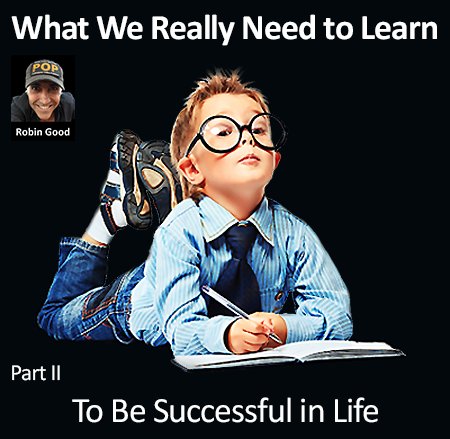
Photo credit: Little boy lying on a floor by Shutterstock
Whether in Manhattan, lost in the jungle, on a remote island or on an extraterrestrial planet, what are the truly critical and life-supporting things that are needed to survive and thrive beyond the animal level? I have first tried to answer this question when I was invited to speak at LeWeb '08 in Paris, as my chosen presentation topic for the event had been "Love for learning". In that occasion, my goal was to communicate both the paradox of 2.0 ideas when confronted with the reality of our present-day school and education system, as well as to explore the key skills that would really be needed to conduct a successful, meaningful life and which could be acquired only by the emergence of a bottom-up, family-ignited (vs. state imposed), self-sustained and lifelong alternative approach to education. In the first part of this guide to what you really need to learn to be successful in life, I had taken on Stephen Downesoriginal ten points from 2006, and tried to refine, expand and curate them in greater depth than I had done the first time around. But as I went through the process of curating those ten original points, I realized how many more skills could have been listed and summarized and therefore I decided to expand drastically the scope of the guide and to include in it all of the skills that I would myself consider mandatory in preparing a human being for a successful, rewarding and meaningful life on this planet (and possibly elsewhere). And as I jotted down some, more would come to mind (I have now identified more than 40 of them). What you will find therefore in this second Part of the guide is a continuation of what done in the first, with the only difference that the skills listed here are the fruit of my own intuition, research and evaluation of what I would like to see added to Stephen Downes original list. Here then, a new set of life-critical skills needed to survive and thrive on this planet and which I think would be good substitutes for most of the topic areas we are forced to learn in our present-day school curriculum. This second set includes:
11) How to Ask Good Questions12) How to Curate 13) How to Focus 14) How to Learn to Speak Other Languages 15) How to Code 16) How to Make Things (Makers) 17) How to Grow Your Own Food 18) How to Survive in the Wilderness 19) How to Provide First Aid 20) How to Defend Oneself
Here all the details: (Part I here)
11) How to Ask Good Questions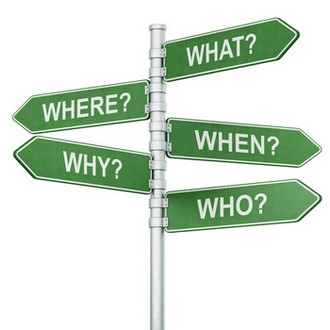
Definition:"to ask good questions means to be able to ask questions that can provide you with the information you need to have."
Source: Robin Good
"Good questions are ships that sail us into discovering lands and that can open up the opportunity to uncover things we would have never imagined... unless we asked."
Source: Robin Good
Backgrounder:Asking questions is the highway to learning and understanding more about the world that surrounds you, about how it works and about how to get anywhere you want to go, physically or mentally.
Due to the way our cultures have developed, to religion, media, education and other factors it is very likely that our individual view of reality is limited to what we have seen, heard and from what other people around us have chosen to believe. Our knowledge of many things is most of the times based at best on trust, and at worst on pure faith, with no verification or inquiry on our hand as to whether something is really true or not.
On the other hand, by learning to ask good questions encourages exploration, critical thinking, engagement, drawing conclusions based on evidence, and it allows to get a deep understanding of any topic.
Asking good questions is what allows you to get where you want to be. So if you want to get there, wherever that is, you need to learn how to ask thought-provoking questions.
To ask good questions is therefore very important because only by asking smart questions you can get faster to the information you need.
Learning to ask good questions is also important because it trains you to evaluate the situation, to analyze its weak or unclear points and to see clearly where is the extra information that you do not have and need to know.
How-to:Play lots of different games that force you to think and to ask yourself many questions.
When dealing with information, play to be an investigator, a Sherlock Holmes who is always on the lookout for valuable clues, and for witness from whom to learn precious facts.
Read relevant books that showcase stories in which individuals ask very relevant questions.
Feel and identify the relevant questioning patterns and make them yours.
Avoid going to traditional earth-bound 19-21st century schools as they will do anything in their power to diminish and reduce human natural curiosity and capability of questioning things.
Learn how to do journalistic writing and investigative reporting and their methods and techniques.
Learn and practice the use of the 5 Ws. These are questions whose answers are considered basic in information-gathering. They are often mentioned in journalism (cf. news style), research, and police investigations. They constitute a formula for getting the complete story on a subject.
- Who is it about?
- What happened?
- Where did it take place?
- When did it take place?
- Why did it happen?
There are three main types of questions:
a) Factual
b) Interpretive
c) Evaluativea) Factual questions are the ones that have only one correct answer.
Example: "What did you have for breakfast this morning?"
Value: Factual questions usually make the best inquiry-based projects, as long as they are answerable and have room for exploration.
b) Interpretative questions have more than one answer, but they still must be supported with evidence.
Example: "Why did Ahab chase Moby Dick?"
Value: Interpretive questions are effective for starting class discussions, for stimulating oral and written language exercises and, sometimes, for leading to good inquiry-based learning projects.
c) Evaluative questions ask for some kind of opinion, belief or point of view, and have therefore no wrong possible answers.
Example: "What would be a good place to take the kids on a field trip?" "Do you agree with Ahab's views on whales?"
Value: good ways to lead discussions and explore books or other artistic works
Source: Asking Questions - The Key to Engaging Students in Learning - LessonPaths
Don't ask yes / no questions. Always dig deeper.
"When you ask a yes or no question, you will most often get incomplete information. Instead, ask an open-ended question. By using an open-ended question you get insights and additional information you might not have known existed."
Source: How to Be Amazingly Good at Asking Questions by Michael Martel - Lifehack
Suggested Readings / Videos:
Video: How to Ask Great Questions by Derek Halpern
Duration: 3':04"
Tools & Resources:- Kahoot - A game-based classroom response system for schools, universities & businesses
12) How to Curate
Definition:"The ability to find, gather, organize, contextualize, add value, present and preserve unique items representative of a specific area of interest either for personal or public interest."
Source: Robin Good
"Content curation. That is process of collecting, organising and displaying information relevant to a particular topic or area of interest."
Source: Charles Christian
Backgrounder:Curation can help a great deal in creating transferrable know-how, and in providing highly useful information references and options that can be used in most any field, from hunting and plant seeding to galaxy or DNA exploration.
The ability to find, gather, collect, organize, present, share and preserve valuable information and/or physical artifacts, is the same mandate originally given to libraries and later to museums.
Both represent a mirror of our cultural heritage and have offered for decades insight, inspiration, great learning opportunities and tangible data to those searching for the understanding of our past, present and future.
In the 21st century, thanks to the Internet and digital media, curatorial skills and abilities have started to become available to anyone with enough interest, time and personal subject matter expertise to take on this demanding task, thus suddenly expanding our potential for collective understanding and learning of at least an order of magnitude.
How-to:To learn how to curate there is no other way but doing it, possibly around a topic or interest for which one has already a good degree of affinity.
When I was a kid for example, some perfect unschooled curation courses were:
- Collecting old stamps or coins
- Being a DJ (both live and on-air)
- Creating beautiful annotated family photo albums
All these passion-drive activities are ideal playgrounds to develop a number of skills which are vital to develop some of critical curatorial abilities. These include:
- Strong interest and motivation for the topic at hand
Unless you are truly motivated in what you are about to curate, it is quite difficult to learn anything useful. So it's best to start from something you really enjoy. Books, movies, places, songs, images, it doesn't really matter as long as your interest in it is very high.
- Time and patience
Curation is by definition a slow process, not one can be rushed or done under pressure. To curate well, having proper time and low pressure is a good thing because to find, pick, organize and add value to any item in a collection it does take time.
- Ordering and classifying
To curate effectively one must practice the science of creating groups, categories and taxonomies. To learn it one must be confronted with the need to organize and separate into relevant groups large numbers of items.
- Pattern recognition
The ability to start noticing similarities and characterizing traits among different objects or information items starts to develop when you dedicate systematic time to review and select these while having a specific set of criteria to make those choices.
- Adding value
Buying, finding or collecting items of whatever kind does not make someone a curator. What makes someone a curator is the ability to add personal value to it, by personalizing it, contextualizing it, labelling and introducing it or by way of how to share and present it to others.
- Presentation and display
A collection inside a drawer is non-existent. A set of records gathering dust in a shelf are useless. A photo album that nobody can look at is like it didn't exist. What matters for a curator is creating venues to share, present, showcase and make his collections as accessible and open as possible and to further augment the value and interest that can be generated by skillfully ordering, juxtaposing, placing, formatting and editing the items in his collection.
- Preservation
A curator is highly motivated to do anything he can to properly archive and physically preserve the collections he has created so that they can remain useful and accessible to others for as long a time as possible.
(example: the recording of a DJ live performance)
Suggested Readings: Guide: Content Curation Guide by Robin Good, 2014 - Gibbon
Guide: Content Curation Guide by Robin Good, 2014 - Gibbon
Tools & Resources:
13) How to Focus
Definition:"the ability to pay particular attention to something specific."
Source: Google
"focus is the ability to pay undivided and sustained attention to what you
have decided to pursue"
Source: Robin Good
Backgrounder:Today, in the 21st century, there is a very large number of people who work and carry out projects while in a continuous state of distraction. From telephones ringing to email, SMS messages, alerts, news, and demands from other people around you, there's a universe of things ready to distract you systematically, unless you take some proactive actions to change this.
I am sure that the experience of having done a million things during a day in front of the computer while feeling as if nothing really important has been achieved is not new to you. The Internet, together with our other telecommunication tools, from TV to phones, are our number one opportunities for mindless distraction, which keeps us feeling busy and engaged, but which also distracts us from focusing on key important goals and keeps us from working on them effectively for sustained periods of time.
Email, instant messages, breaking news, tweets and social media posts offer the opportunity for a sustained stream of micro-orgasms, as within a very short amount of time you can address, check and do something with them easily. Micro-tasks which indeed keep you busy and engaged and with a sustained stream of small rewards, but which do not move your bottom-line strategy and need to get larger projects and ideas moving.
Imagine how much better could be your work could be if you were able to focus more and longer on one task at a time without being distracted by all these micro-tasks.
Whether the task at hand is to take a decision, to evaluate alternative solutions or to write an article, the more you are able to focus the more successful and effective you will be at executing that task.
How-to:- Set your priorities
To be able to focus the first thing you need to do is to set your priorities so that you don't have many things pressing your mind at the same time. Lay down all you want to do and set an order of importance for the things you want to do. First should be the items that have the most impact on your ability to achieve your desired goal(s).
- Time your assignments
Set also a predefined amount of time you want to devote to a certain activity, instead of going on with it until you are completely done. While "not giving up until one has fully achieved a goal" is a valuable skill, it is more important first to master how to achieve something within a specified time constraint rather than not having any constraints at all on this front.
- Turn off distractions
Switch off anything that can distract you. If you have a computer or smartphone, you have right there the source of tens of possible distractions. Turn them all off. Close all your alerts, email notification systems, turn off your phone and ask someone else to handle the door. Initially, the more external distractions are present, the more difficult it will be more difficult for you not to pay attention to them for extended periods of time. As you train yourself to focus, external distractions will matter less and less.
- Create a focused environment
Architect and organize your space (in the case of your office or studio) in a way that supports focus and reduces distractions to a minimum. Physical distractions include not just sound generating devices, TV sets, radio, but also the amount of free space and orderliness around you. So a desk full of messy papers and books with little space available for you to write or take notes is not the ideal situation in which to increase your ability to focus.
- Focus on one thing at a time
Notwithstanding what you may have read on the web, by definition it is possible to achieve maximum focus only by dedicating yourself to one activity. If you engage in multiple activities at the same time one or more of them will receive less attention units and care from you than if you were engaged in just one. Avoid then the habit of doing more things at the same time, or the even more popular one of rapidly switching among different tasks (from email replies, to browsing, to writing, etc.) with the illusion of being more productive and faster.
- Have a specific objective
You can't really focus on something unless you have decided first what it is that you want to achieve and what needs to be done to reach that specific goal. The clearer the goal is, the more focus can be applied to achieving it. The less clear is the final objective to be reached, the more difficult it will be to effectively focus on what really needs to be done.
- Break tasks into simple steps
To facilitate task execution, whatever the job at hand, it is always best to break down and see the work to be done split down into several smaller tasks rather than looking at it as one monolithic big task. The more you learn how to break down your selected assignment into several small tasks, the easier it will become to carry out large tasks while remaining highly focused throughout the process.
Suggested Readings / Videos: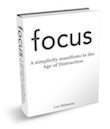 Book: Focus by Leo Babauta
Book: Focus by Leo Babauta
Tools & Resources:
14) How to Learn to Speak Other Languages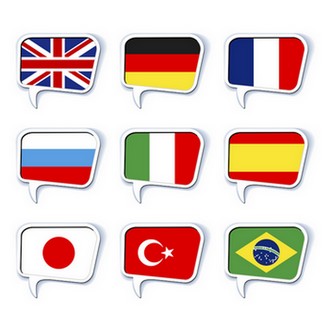
Definition:
"Being able to communicate to others through a spoken language different than your native one."
Source: Robin Good
Backgrounder:Learning a foreign language can be very useful in living a successful life, as by knowing more than one language one can dramatically expand the number of places and people he can get to know and talk to. Being able to read and write in more than one language also opens up access to new literatures, traditions, and ideas.
Furthermore, being bilingual, and/or being exposed to two languages and cultures, can foster greater tolerance for other cultural groups.
People who have learned more than one language can think better, and even fend off old age ailments.
"Being bilingual, it turns out, makes you smarter. It can have a profound effect on your brain, improving cognitive skills not related to language and even shielding against dementia in old age."
"In a recent study of 44 elderly Spanish-English bilinguals, scientists led by the neuropsychologist Tamar Gollan of the University of California, San Diego, found that individuals with a higher degree of bilingualism -- measured through a comparative evaluation of proficiency in each language -- were more resistant than others to the onset of dementia and other symptoms of Alzheimer's disease: the higher the degree of bilingualism, the later the age of onset."
Source: Why Bilinguals Are Smarter by Yudhijit Bhattacharjee, March 2012 - The New York Times
Learning a different language than one's own native one, requires a lot of active effort, creativity and discipline, which the learning process can also help strengthen.
On the other hand it is also true that knowing two languages makes it easier to learn additional languages.
Knowing more than just one language creates a new mental thinking apparatus which can provide additional flexibility to our intellectual capabilities, as the ability to interpret and describe things in more than one way, or the ability to describe and process reality through a completely different set of sounds enhances our ability to analyze, recognize differences and common patterns.
How-to:Here are ten straightforward actions you can take to start learning a foreign language now:
- Find a very strong motivation to do so.
- Get familiar with the sound and with the faces. Watch films, people singing, pay close attention to the words and to how they pronounce them. Look at their facial expressions when words are being pronounced.
- Familiarize yourself with the basic building blocks of that language, so that you can say some very basic things.
- Start playing and conversing with someone else.
- When you learn another language the rule n.1 is to speak only and exclusively the language you want to learn. Always. Even to ask for help.
- Learn by heart songs and poems and get to fully understand their meaning.
- Play games - physical and digital - that you greatly enjoy, in the new language you want to master.
- Once you have the basics immerse yourself in a group of people that does something you really enjoy but who speaks only the language you want to learn. For example sign-up for a theater, music, painting or even a sport class you really love but which is offered in the language you want to learn.
- Read more books and write down what you learn in the new language.
Suggested Readings / Videos:
Video: How To Learn Any Language in Six Months by Chris Lonsdale
Duration 18':26"
Tools & Resources:
15) How to Code
Definition:"write code for (a computer program)."
Source: Google
"Coding is the ability to read and write a machine language as well as to think computationally."
Source: Doug Belshaw
"ability to codify commands, procedures to a machine capable of executing them unassisted."
Source: Robin Good
Backgrounder:In a world where almost everything has either a digital component or is somehow digitally mediated, being able not only to be receivers but learning how to act-upon, modify and design our environment is without doubts a life critical skill.
Also, learning how to code is not so much about equipping future generations to work as software developers, but it is more about promoting the idea of "computational thinking".
"Computational thinking is how software engineers solve problems. It combines mathematics, logic and algorithms, and teaches you a new way to think about the world.
Computational thinking teaches you how to tackle large problems by breaking them down into a sequence of smaller, more manageable problems. It allows you to tackle complex problems in efficient ways that operate at huge scale. It involves creating models of the real world with a suitable level of abstraction, and focus on the most pertinent aspects. It helps you go from specific solutions to general ones."
Source: Why every child should learn to code by Dan Crow, February 2014 - The Guardian
In essence, learning how to code, can be classified as an essential life skill because:
a) It helps you to get good at solving problems
Writing, debugging and remixing your own and other people's code are fundamentally problem-solving activities. Whether it's code that won't run because of syntax errors, something working differently than you expected, or figuring out how to do something cool, these are all things that involve lateral thinking. And often this problem-solving involves working with other people - either in real-time or following tutorials, blog posts and howtos (and then sharing back).
b) It boosts your confidence and sense of value
Knowing how things work, understanding the deep meaning of something often leads to an increased sense of confidence. By this I refer to a sense of confidence in being causative about reality and the environment that surrounds us as wel as in shaping it to suit our future goals and needs.
c) It gives you opportunity to shape reality
Knowing how to code opens up the opportunity to design and realize anything from software applications, to digital appliances, useful services, physical objects and even art objects. Realising that you can not only change and influence things, but build things that other people can use is, Steve Jobs said, is "perhaps the most important thing."
d) It allows to see what's under the hood
Understanding how code works can help you have a much better understanding how things work or don't, instead of having to depend on "experts" or other third-parties to help you make sense of them. At the simplest level you can imagine someone who publishes a web page and who can inspect and detect whether there is some technical error in it, from someone in the same situation who can't do anything, if the page doesn't show up properly, but to call in an expert to see what's wrong with it.
How-to:To learn how to code is very similar to learning a foreign language, the key difference being that a code language is not spoken, but "executed" by a computer or a machine.
To communicate with a machine body language and emotions are of no use, and what really counts is knowing what "words" and "syntax" is used to communicate and how to reason following always a strict logical reasoning approach. "Logic" or more specifically "Predicate logic" is the type of reasoning needed to become a good coder.
Basically what it boils down to is that when you code you really need to be able to convert your ideas into symbols and specific actions you want to be executed under pre-defined circumstances.
A good first step in learning how to code is to start by creating something simple that actually works. IFTTT and Zapier are two online services where you can put to use some of the basics of coding without really having to learn anything more than what you already know. Both services are in fact based on the idea that you can create highly useful tools and simple programs by simply connecting and hooking up different applications and events. Say for example that you want the name and email of each person that signs up for your newsletter to be added to a special database you have created. Both IFTTT and Zapier can assist you in creating a custom app that does exactly what you want by allowing you to set and define the rules of what needs to be done and what is going to trigger it.
Then, if you want to move to learn more formal approaches to creating code, you can sign up for an account at Code Academy or Khan Academy. They have a lot of interactive tutorials that will teach you basic programming concepts explained in simple video tutorials.
Suggested Readings: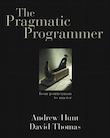 Book: The Pragmatic Programmer by Andrew Hunt and David Thomas, 1999
Book: The Pragmatic Programmer by Andrew Hunt and David Thomas, 1999
Tools & Resources:- BentoBox
A curated resource guide to help you find where to learn how to code online, depending on specific subject and need.
- Mozilla Webmaker
A global community dedicated to teaching digital skills and web literacy.
- CodeAcademy
Build Projects. Learn to create interactive websites, fun games, and killer apps.
- CodeAvengers
Courses carefully designed to truly entertain while leveling your programming skills.
- Code
Game-like, self-directed learning environment provides basic concepts of Computer Science with drag and drop programming.
- CodeHS
Simple and fun game programming lessons that involve problem solving, JavaScript, animation, data structures, game design and puzzle challenges.
- Khan Academy
Learn the fundamentals of programming.
- CodeCombat
Learn how to code in JavaScript by playing a game.
- TOP 10 Websites Where To Learn Coding by Alavris Falcon, 2013 - Hongkiat
16) How to Make Things (Makers)
Definition:"a person or thing that makes or produces something."
Source: Google
"any activity that uses an element of creative skills to make or design something on your own."
Source: Brit Morin
"The maker culture is a contemporary culture or subculture representing a technology-based extension of DIY culture. Typical interests enjoyed by the maker culture include engineering-oriented pursuits such as electronics, robotics, 3-D printing, and the use of CNC tools, as well as more traditional activities such as metalworking, woodworking, and traditional arts and crafts.."
Source: Wikipedia
Backgrounder:The art of making should be appreciated and celebrated, as unless there were people who loved to invent, design and make things we would still be living in caves.
The rise of the "maker culture" is closely associated with the rise of hackerspaces, fab labs and other "maker spaces". Hackerspaces for example are places specifically dedicated to allow like-minded individuals to share ideas, tools, and skillsets.
"Welcome to the Maker Movement, an evolution of millions of people who are taking big risks to start their own small businesses dedicated to creating and selling self-made products.
In a world of mass-produced products, modern technology has made it easier than ever for a single individual to create and distribute items that are customizable and unique without having middlemen like manufacturers."
Source: What Is the Maker Movement and Why Should You Care? by Brit Morin, February 2013 - Huffington Post
"It doesn't require a major life change (like losing a job or facing a similar crisis) to get involved. These are skills you can develop on part time basis - a few nights a week or a weekend here and there. In fact, no matter what your day job may be, you'll find these new skills can be complementary and helpful in your everyday life."
"making is very little about DIY - it's all about DIT (Do-It-Together). In the maker movement, the art of collaboration is the key to innovation and productivity."
Source: Zero To Maker: A Re-Skilling Guide for New Makers by David Lang - KickStarter
How-to:If it can be imagined it can be made. Begin with the end in mind.
The first step in making a thing, even a non-physical thing, is visualizing it. Making things always combines form with function.
A most effective step in refining/developing a thing is collaborating with others on it.
Suggested Readings/Videos: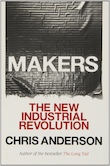 Book: Makers: The New Industrial Revolution by Chris Anderson, 2012
Book: Makers: The New Industrial Revolution by Chris Anderson, 2012
Tools & Resources:
17) How to Grow Your Own Food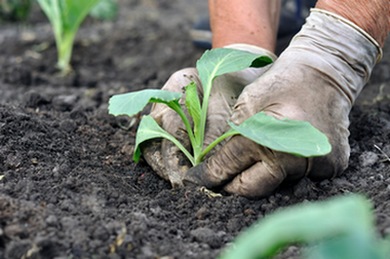
Definition:Where and how to procure for yourself the food you need to eat and survive, when it is not immediately available for purchase in a nearby shop."
Source: Robin Good
Backgrounder:To eat is a vital function for any human being but presently we take for granted that food will be available for purchase in a nearby store, so that when you are hungry, you can go there and buy it.
To become full citizens of this planet I think it is in our own individual and community interest not to depend always on third-party sources, whether public or commercial, to provide us with the critical means of survival.
Until less than 100 years ago the majority of people in the planet knew how to cultivate and grow their food independently and having all of the resources needed within their community.
It is quite evident and documented by recent events, that if there was even just a significant electricity or transportation blackout most people would be 100% unprepared in being able to survive and feed themselves for an extended period of time with their own means.
The benefits of learning how to feed ourselves as self-sufficiently as possible are many. Some of the more evident ones are higher food quality, no need to depend on large scale farming and OGM seeds, money savings, energy savings, no pesticides or other poisonous substances in our food, support for biodiversity.
How-to:To learn how to be self-sufficient when it comes to food we evidently need to go back to learn and practice how to cultivate and grow our own foods in house, in our backyards, or in place of our existing front door green lawns.
Developing also a renewed sense of respect for food and for the practice of eating would help us re-learn to see food not as a recreational activity designed give pleasure but once again as an essential life activity which must be treated with respect. Following and getting involved with the various Slow-Food initiatives can be a good step in the right direction.
To be able to conquer back our ability to feed ourselves it is mandatory that we go back and learn more about our body, how it works and about nutrition and how it relates to our physiological needs. If we don't understand how our bodies need to be nourished and fed it is quite impossible that we can learn and master how to properly feed ourselves.
This learning path should include reconquering the ability to become familiar again with nature's natural provision of food and in getting to know them in depth, and beyond the few ones normally served on our dinner tables. It would be wonderful to get to know again how to recognize and identify edible foods from poisonous ones and how to extract the most nutritious elements from any raw food available out there.
The better skilled we become at becoming skillful gardeners, fruit and vegetable farmers the better we can nourish ourselves, keeping away poisons and risks from our diet while becoming fully self-sufficient in providing ourselves with food.
Suggested Readings: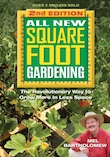 Book: All New Square Foot Gardening, Second Edition: The Revolutionary Way to Grow More In Less Space by Mel Bartholomew, February 2013
Book: All New Square Foot Gardening, Second Edition: The Revolutionary Way to Grow More In Less Space by Mel Bartholomew, February 2013
18) How to Survive in the Wilderness
Definition:Knowledge of all the basic skills required to survive in the wilderness."
Source: Robin Good
Backgrounder:How long can you survive if you were stranded on an island, in the jungle or on a mountain where your airplane has unexpectedly crash landed?
- You can survive for three hours without enough warmth.
- You can survive for three days without water.
- You can survive for three weeks without food.
Very few people can survive much longer under these circumstances unless they have trained themselves before on how to handle these emergency situations.
- How do you purify water?
- How to make a fire?
- How do you procure yourself food if there is snow or sand all around you?
- What do you do if you need to cross a river or a lake?
- How do you signal other for help?
These are just some of the many skills that are absolutely required to be able to survive in a wild situation with no outside help.
How-to:To prepare oneself for living in the wilderness there is no better training than learning the skills of wildlife explorers, jungle trailers and sherpas. These are the people who have best developed the needed skills to survive and nourish themselves even under extremely adverse situations.
If you look at these people and at how they prepare and organize themselves you can immediately notice some important things:
1) The most important thing is to stay warm and dry.
2) The least important thing is having enough food.
Suggested Readings/Videos:
Video: How To Survive In The Wilderness by Dale Collett
Duration: 3':01"
19) How to Provide First Aid
Definition:how to provide life-saving assistance to another human being in emergency situations, where there are no other accessible aid."
Source: Robin Good
Backgrounder:Nonetheless we live in the 21st century, with plenty of technology, medical aid, communication tools available to us, it is not impossible to find oneself in situations where there is no immediate external professional aid that can be accessed, and where knowing what to do and how can be decisive.
It is therefore a vital learning skill the ability to provide immediate first-aid emergency assistance to another human being in those cases where there is no-one else there to help you or to call.
The "ABC" of first aid, is a set of three area of critical concerns that are given first priority attention in emergency situations involving a human being. These three checks which focus on any critical life-saving intervention, must always be executed before treating less serious injuries.
The ABC of first aid stands for:
- Airway,
- Breathing, and
- Circulation.
How-to:The best thing to do to learn what to do and how do it in emergency, life-critical situations, where your intervention can save another person life is to take some specialty courses on the topic and to do some real-life experience by volunteering in providing part-time help in emergency and rescue support services.
The best type of first aid training can generally be accessed by attending professional courses, typically leading to certification.
"Due to regular changes in procedures and protocols, based on updated clinical knowledge, and to maintain skill, attendance at regular refresher courses or re-certification is often necessary. First aid training is often available through community organizations such as the Red Cross and St. John Ambulance, or through commercial providers, who will train people for a fee.
Basic principles, such as knowing to use an adhesive bandage or applying direct pressure on a bleed, are often acquired passively through life experiences. However, to provide effective, life-saving first aid interventions requires instruction and practical training. This is especially true where it relates to potentially fatal illnesses and injuries, such as those that require cardiopulmonary resuscitation (CPR); these procedures may be invasive, and carry a risk of further injury to the patient and the provider."
Source: Wikipedia
Suggested Readings: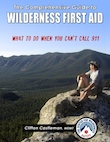 Guide: The Comprehensive Guide to Wilderness First Aid by Clifton Castleman, 2012
Guide: The Comprehensive Guide to Wilderness First Aid by Clifton Castleman, 2012
20) How to Defend Oneself
Definition:to be able to defend oneself from external attacks either verbal, psychological or physical."
Source: Robin Good
Backgrounder:Not everyone around is there to love you and to make your life easy. No matter what you do, or how good you are, there will always be people and organizations that will go out of their way to put you in difficulty, to derail you from your path or to ruin your best plans of action.
For these reasons it is good to be skilled at the art of defending oneself from external attacks, whether verbal, psychological or physical.
How-to:One wise step to take in defending oneself is to find out or discover as fast as possible what is the reason for which you are being attacked. Knowing the reason of the attack can greatly assist you in finding the most appropriate action to take in these delicate situations.
To defend oneself does not mean to be able to defend oneself just physically but also from verbal and psychological attacks.
The best course of action to take when in need to defend yourself is this:
1) Understand what is going exactly
2) Listen, if possible, before jumping to fast conclusions
3) Evaluate how to respond by taking into primary consideration the consequences of your actions whether they be physical or just words.
The typical, automatic reactions to an attack are almost never the most appropriate ones. These are:
a) Fighting back
b) Pleading
c) Debating
d) Fleeing the scene
None of these is appropriate to defend oneself from a verbal attack.
The best approach to learn is one that communicates in a clear, concise and firm fashion that you are not going to be an easy victim or an approach that does not offer to the attacker opportunity for insisting (divert and distract, bore him to death, etc.).
Suggested Readings: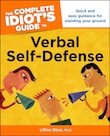 Guide: The Complete Idiot's Guide to Verbal Self Defense by Lillian J. Glass, 1999
Guide: The Complete Idiot's Guide to Verbal Self Defense by Lillian J. Glass, 1999
End of Part II
See Part I: What We Really Need To Learn To Be Successful In Life - Part I
And Part III: What You Really Need To Learn To Be Successful In Life - Part III
And Part IV: What You Really Need To Learn To Be Successful In Life - Part IV
And Part V: What You Really Need To Learn To Be Successful In Life - Part V
Originally written and curated by Robin Good and first published on MasterNewMedia on Tuesday May 6th 2014 as What We Really Need To Learn To Be Successful In Life - Part II.
Photo credits:How to Ask Good Questions - Street signs with WH wordsby ShutterstockHow to Curate - Collection of butterflies by ShutterstockHow to Focus - Camera photo lens by ShutterstockHow to Learn to Speak Other Languages - Languages by ShutterstockHow to Code - Program code by ShutterstockHow to Make Things - Home buyer works by ShutterstockHow to Grow Your Own Food - Woman planting cabbage by ShutterstockHow to Survive in the Wilderness - Survival by ShutterstockHow to Provide First Aid - Helping hands by ShutterstockHow to Defend Oneself - Armour of the medieval knight by Shutterstock
-
What We Really Need To Learn To Be Successful In Life - Part I
If there were no schools and traditional academic curriculums, and one had the option to question and rethink a human being learning curriculum what would be in it? 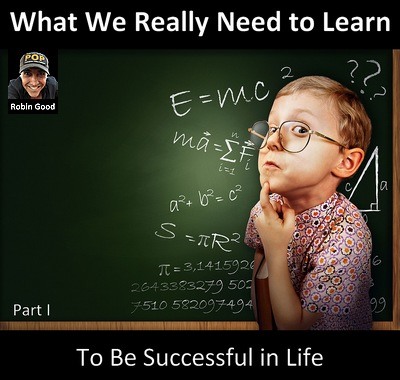
Photo credit: Clever pupil boy by Shutterstock
If we suspend momentarily the reasoning and goals that went into the creation of the present educational system, what would be the key things that an individual would really benefit to know in order to survive, be independent, self-sufficient and to live a meaningful life in the 21st century? In 2006 I published on MasterNewMedia How To Be Successful, a very instructive guide originally written by Stephen Downes and which was originally published as Things You Really Need To Learn. Today, eight years after, I have decided to go back to that guide and dissected it, updated it, curated it and expanded on it as to further broaden up its scope and usefulness. What I have done is the following. I have:
- first re-read corrected, edited and improved the original text, by making several improvements to it.
- applied a simple content structure to each learning topic as to have an easier to scan information setup, transforming what was basically a normal article, into a set of information cards.
- added my own content contributions in many different parts, by introducing new text and relevant additions.
- added to each learning point relevant definitions, suggested readings, video clips, books and tools or resources when available.
- added custom images to each one
- expanded the original ten points into thirty and structured them into a three-part guide.
Here follows Part I with the first ten points, originally identified by Stephen Downes, curated and presented into this new updated edition:
1) How To Predict Consequences2) How To Read 3) How To Distinguish Truth from Fiction 4) How To Empathize 5) How To Be Creative 6) How To Communicate Clearly and Effectively 7) How To Learn 8) How To Stay Healthy 9) How To Value Yourself 10) How To Live Meaningfully
1) How To Predict Consequences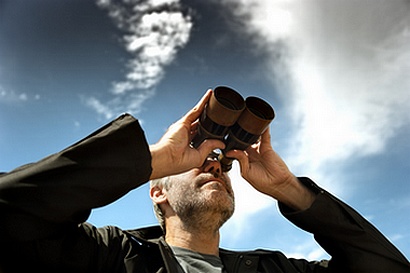
Definition:"...the effect, result, or outcome of something occurring earlier"
Source: Dictionary.Reference
"something that happens as a result of a particular action or set of conditions"
Source: Merriam Webster
Backgrounder:People don't think ahead.
The most common utterance at the scene of a disaster is, "I never thought..." The fact is, most people are very bad at predicting consequences, and schools never seem to think to teach them how to improve.
The prediction of consequences is part science, part mathematics, and part visualization. It is essentially the ability to create a mental model imaging the service of events that would follow, "what would likely happen if...?"
The danger in such situations is focusing on what you want to happen rather than what might happen instead. When preparing to jump across a gap, for example, you may visualize yourself landing on the other side. This is good; it leads to successful jumping. But you need also to visualize not landing on the other side.
What would happen then? Have you even contemplated the likely outcome of a 40 meters fall?
How-to:You should always be taking the opportunity to ask yourself, "what will happen next?" Watch situations and interactions unfold in the environment around you and try to predict the outcome.
To learn how to predict consequences you need to compare the current situation with your past experience and calculate the probabilities of different outcomes. If, for example, you are looking at a five meter gap, you should be asking, "How many times have I successfully jumped five meters? How many times have I failed?" If you don't know, you should know enough to attempt a test jump over level ground.
Write down or blog your predictions.
With practice, you will become expert at predicting consequences.
Even more interestingly, over time, you will begin to observe patterns and generalities, things that make consequences even easier to predict. Things fall, for example. Glass breaks. People get mad when you insult them. Hot things will be dropped. Dogs sometimes bite. The bus (or train) is sometimes late. These sorts of generalizations - often known as 'common sense' - will help you avoid unexpected, and sometimes damaging, consequences.
Suggested Readings: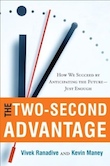 The Two-Second Advantage: How We Succeed by Anticipating the Future-Just Enough by Vivek Ranadive and Kevin Maney, 2011 The Two-Second Advantage: How We Succeed by Anticipating the Future-Just Enough by Vivek Ranadive and Kevin Maney, 2011
2) How To Read
Definition:"to look at carefully so as to understand the meaning of (something written, printed, etc.)"
Source: Dictionary.Reference
"to look at and understand the meaning of letters, words, symbols, etc."
Source: Merriam Webster
"how to look at some text and to understand, in a deep way, what is being asserted (this also applies to audio and video)."
Source: Stephen Downes
Backgrounder:A lot of writing is fill - wasted words intended to make the author look good, to distract your attention, or to simply fill more space. Being able to cut through the crap and get straight to what is actually being said, without being distracted, is an important skill.
Though your school will never teach you this, find a basic book on informal logic (it will have a title like "critical thinking" or something like that). Look in the book for argument forms and indicator words (most of these books don't cover the other three types of writing) and practice spotting these words in text and in what the teacher says in class. Every day, focus on a specific indicator word and watch how it is used in practice.
How-to:The four major types of writing are: description, argument, explanation and definition. You should learn to recognize these different types of writing by learning to watch for indicators or keywords.
Then, you should learn how sentences are joined together to form these types of writing. For example, an argument will have two major parts, a premise and a conclusion. The conclusion is the point the author is trying to make, and it should be identified with an indicator (such as the words "therefore", "so", or "consequently", for example).
Suggested Readings / Videos:
Video: How To Read A Book For Maximum Learning by Matt Morris
Duration: 6':25''
3) How To Distinguish Truth from Fiction
Definition:"How to tell accurate information from inaccurate information, misinformation, and disinformation."
Source: Howard Rheingold
"The process of inspection, analysis and verification used to understand the truthfulness, objectivity and bias of any information, news or story."
Source: Robin Good
Backgrounder:Unfortunately this is an area largely forgotten by classical education.
One of the reasons for this is likely due to teachers feeling their students must absorb knowledge uncritically. Their pedagogical assumptions include such as myths as the one that if students question everything the teacher says, then they cannot really learn anything. That is, unless they memorize without questioning, learning, in their view, is not achieved.
But one of the first and most important elements of good learning is the ability to question what is given for granted and the one to verify and check where assumptions or data are actually failing.
How-to:The first thing to learn, to become capable of detecting crap or false information is to actually question:
- what you are told,
- what you read,
- what you see on television and in general,
- what others would seem to take for obvious or granted.
Do not simply accept what you are told.
Always ask, how can I verify that this is true?
What evidence would be needed to make me believe that this is false?
Every day, subject at least one piece of information (a newspaper column, a blog post, a classroom lecture) to thorough scrutiny. Analyze each sentence, analyze every word, and ask yourself what you are expected to believe and how you are expected to feel.
Then ask whether you have sufficient reason to believe and feel this way, or whether you are being manipulated.
Suggested Readings / Videos: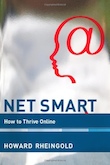 Net Smart: How to Thrive Online by Howard Rheingold, 2012 Net Smart: How to Thrive Online by Howard Rheingold, 2012
Tools, Resources:
4) How To Empathize
Definition:"Empathy is a genuine feeling in yourself that operates in synch with another person. Empathy is a way of accessing another person inner mental states through the sympathetic operation of your own mental states."
Source: Stephen Downes
"Empathy is the capacity to recognize emotions that are being experienced by another sentient or fictional being."
Source: Wikipedia
Backgrounder:Every person on this planet has his own distinct view of life, reality and on how things work and on what is really important.
To assume that since we are all human beings we are all alike and we think, see and evaluate things in the same way is a very crass mistake.
No-one is exactly like you. We are all different, not just in the way we look, but also and more importantly, in the way we perceive and think. Everyone lives in his own customized "realized" and has its own view of life and on how things work.
Understanding this fact, will save you from the error of assuming that everyone else is like you. And even more importantly, this will allow other people to become a surprising new source of knowledge and insight for you.
Part of this process involves seeing things through someone else's eyes. A person may be, quite literally, in a different place. They might not see what you see, and may have seen things you didn't see. Being able to understand how this change in perspective may change what they believe is important.
When you are empathetic you will begin to seek out and understand ways that help bridge the gap between you and other people.
Being polite and considerate, for example, will become more important to you. You will be able to feel someone's hurt if you are rude to them. In the same way, it will become more important to be honest, because you will begin to see how transparent your lies are, and how offensive it feels to be thought of as someone who is that easily fooled.
How-to:To learn how to empathize you need to be able to imagine how other people feel. The better you become at this, the easier it will become for you to understand more rapidly the situation while being able to establish more effective communication channels.
This means that you have to create a mental model of the other person's thoughts and feelings in your own mind, and to place yourself in that model.
This is best done by imagining that you are the other person, and then placing yourself into a specific situation.
An excellent approach to master how to immerse yourself in the character of another person is to study drama (learning how to act in plays) or by spending some time in different role-playing games (RPGs) and practicing being someone else, with different beliefs and motivations.
Suggested Readings / Videos:
Video: What is empathy?
Duration: 3':31"
5) How To Be Creative
Definition:"the ability to make new things or think of new ideas."
Source: Stephen Downes
"Creativity is the ability to recognize patterns, and to use individual elements from them to remix, recombine and mash-up apparently unrelated ideas, concepts and approaches, into new ones."
Source: Robin Good
Facts / Backgrounder:Contrary to popular belief:
- Everybody can be creative.
- Humans have a natural capacity to be creative, because that's how our minds work.
- With systematic practice anyone can become very good at it.
- The trick to learn creativity is to understand how creativity works.
Many people think that creative ideas spring out of nothing, but creativity is in fact the result of using and manipulating your knowledge in certain ways.
Genuine creativity is almost always a response to something. This article, for example, was written in response to an article on the same subject that I thought was not well thought out.
You could say in fact, that creativity blooms in situations where there's a need to face an issue, a problem or a difficult situation.
How-to:In order to train oneself to be more creative, here is where you need to look:
- problems to solve,
- things that merit a response,
- needs that need to be filled.
This takes practice (try writing it down, or blogging it, every time you see a problem or need).
In addition, creativity involves a transfer of knowledge from one domain to another domain, and sometimes a manipulation of that knowledge. When you see a gap in real life, how did you cross a similar gap in an online game?
Creativity, in other words, often operates by metaphor, which means you need to learn how to find things in common between the current situation and other things you know.
This is what is typically meant by "thinking outside the box" - you want to go to outside the domain of the current problem. And the particular skill involved is pattern recognition.
Pattern recognition is a hard skill to learn, and it requires a lot of practice. This is one of the reasons why it takes time to and parctice to become more creative.
Also
Learn to collect, curate and recognize similar works in:
- in music
- in photography
- in paintings
- in poetry
- in movies
- in books
Develop a true passion / interest for one of the creative arts and immense yourself periodically into it, so that you can absorb enough different materials to be able to start noticing patterns.
Suggested Readings / Videos:
Video: How schools kill creativity by Ken Robinson
Duration: 19':25"
6) How To Communicate Clearly and Effectively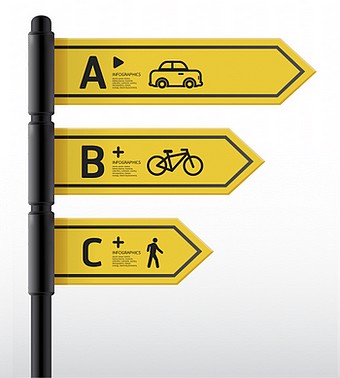
Definition:"Communicating clearly is most of all a matter of knowing what you want to say, and then employing some simple tools in order to say it. Hardest part: knowing what you want to say."
Source: Stephen Downes
"Communicating effectively means to be able to convey a specific message using the minimum amount of words, while achieving the maximum level of comprehension on the part of the listener/viewer/receiver."
Source: Robin Good
Facts / Backgrounder:To communicate effectively has nothing to do with the ability to speak, or to articulate words or sentences comprehensibly and accent-free in a specific language.
Effective communication is listener-driven. It cannot be self-directed by the communicator without full awareness and understanding of the receiver needs and available reception apparatus.
Perfect communication is the result of a very high level of empathy, affinity and understanding of the receiving end language, terminology, education, background and expectations.
Good, clear and effective communication is often recognizable by its simplicity, straightforwardness and conciseness.
Key elements that also contribute to higher levels of communication effectiveness include:
- language and terminology,
- empathy,
- affinity, shared reality and
- structure.
For example, professional writers employ a small set of fairly standard structures. Other writers prefer articles (or even whole books) consisting of a list of points, like this article. Another structure, often called "pyramid style", is employed by journalists - the entire story is told in the first paragraph, and each paragraph thereafter offers less and less important details.
Inside this overall structure, writers provide arguments, explanations, descriptions or definitions, sometimes in combination. Each of these has a distinctive structure. An argument, for example, will have a conclusion, a point the writer wants you to believe. The conclusion will be supported by a set of premises. Linking the premises and the conclusion will be a set of indicators. The word "therefore", for example, points to the conclusion.
Becoming familiar with such structures and with the elements that compose them can prove very useful in acquiring greater awareness of the communication devices at one's own disposal.
How-to:- To learn to communicate clearly the first thing to do is to become aware of how you are communicating now.
- Re-read aloud what you write.
- Listen with the ears of someone else (put yourself in someone else shoes, and listen as if you were that person, and see if that person would understand you).
- Clarify to yourself what you want to say before you say it. You achieve this by not talking or replying impulsively but by reflecting and thinking before doing it.
- Employ some structure, in the things you say, so that who is listening, can follow your reasoning, story or explanation more easily. Some of the best ways to learn how to structure your communications (whether in writing or not) are:
1) Learn how to give speeches without notes. This will force you to employ a clear structure (one you can remember) and to keep it straightforward.
2) Learn the structure of arguments, explanations, descriptions and definitions.
3) Learn the indicator words used to help readers navigate those structures.
4) Master basic grammar, so your sentences are unambiguous.
5) Master the tools the professionals use.
- Practice your writing every day. A good way to practice is to join a student or volunteer newspaper - writing with a team, for an audience, against a deadline. It will force you to work more quickly, which is useful, because it is faster to write clearly than to write poorly. If no newspaper exists, create one, or start up a news blog.
- Learn sign-language.
- Go to live in another country and learn another language.
- Read lots of good books.
Suggested Readings / Videos: Winging It: Everybody's Guide to Making Speeches Fly Without Notes by Keith Spicer, 1982 Winging It: Everybody's Guide to Making Speeches Fly Without Notes by Keith Spicer, 1982
7) How To Learn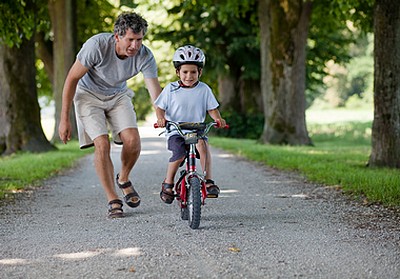
Definition:"to acquire knowledge of or skill in by study, instruction, or experience"
Source: Dictionary Reference
"to gain knowledge or skill by studying, practicing, being taught, or experiencing something"
Source: Merriam Webster
""Learning":is the act of acquiring new, or modifying and reinforcing, existing knowledge, behaviors, skills, values, or preferences and may involve synthesizing different types of information."
Source: Wikipedia
Facts / Backgrounder:Your brain consists of billions of neural cells that are connected to each other. To learn is essentially to form sets of those connections.
When you learn, you are trying to create patterns of connectivity in your brain. You are trying to connect neurons together, and to strengthen that connection. This is accomplished by repeating sets of behaviours or experiences. Learning is a matter of practice and repetition.
Think about learning as how to throw a baseball. Someone can explain everything about it, and you can understand all of that, but you still have to throw the ball several thousand times before you get good at it. You have to grow your neural connections in just the same way you grow your muscles.
The study of mathematics, history, science and mechanics can be more effectively viewed as the study of archetypes and the basic patterns that you will recognize over and over.
Because you are trying to build networks of neural cells, it is better to learn a connected whole rather than unconnected parts, where the connected whole you are learning in one domain has the same pattern as a connected whole you already know in another domain.
Learning in one domain, then, becomes a matter of recognizing that pattern.
When studying any academic discipline, one should always ask "what is the pattern?" (and not merely "what are the facts?"). Asking this question will actually make these disciplines easier to learn.
Some people think of learning as remembering sets of facts. It can be that, sometimes, but learning is generally more about pattern recognition than about remembering.
Learning to learn is the same as learning anything else. It takes practice.
How-to:When learning anything, do not simply learn it in isolation, but look for patterns:
a) Does it fit into a pattern you already know?
b) Is it a type of thing you have seen before?
Embed the new word or concept you want to learn about into your existing knowledge by using it in some way - write a blog post containing it, or draw a picture explaining it.
Think / Become aware of, always:
1) how you are learning and
2) what you are learning at any given moment.
Remember, you are always learning - which means you need to ask:
- What are you learning when you are:
- watching television,
- going shopping,
- driving the car,
- playing baseball?
- What sorts of patterns are being created?
- What sorts of patterns are being reinforced?
- How can you take control of this process?
Sometimes the patterns we use are very artificial, as in 'every good boy deserves fudge' (the sentence helps us remember musical notes). In other cases, and more usefully, the pattern is related to:
- the laws of nature,
- logical or mathematical principles,
- the flow of history,
- how something works as a whole.
Drawing pictures often helps people find patterns (which is why mind-maps and concept maps are so popular for learning, explaining and illustrating new concepts and ideas).
Suggested Readings / Videos:Love of Education: A Shifting Paradigm by Robin Good
Duration: 34':09"
8) How To Stay Healthy
Definition:"possessing or enjoying good health or a sound and vigorous mentality"
Source: Dictionary Reference
"to enjoy a fully functioning body"
Source: Robin Good
Facts / Backgrounder:As a matter of practical consideration, the maintenance of your health involves two major components:
- minimizing exposure to disease, poisons or toxins, and
- maintaining your physical body in good shape.
1) Minimizing exposure to disease and toxins is mostly a matter of cleanliness and order. Simple things - like keeping the wood alcohol in the garage, and not the kitchen cupboard - minimize the risk of accidental poisoning. Cleaning cooking surfaces and cooking food completely reduces the risk of bacterial contamination. Washing your hands regularly prevents transmission of human borne viruses and diseases. etc.
In a similar manner, some of the hot-button issues in education today are essentially issues about how to warn against exposure to diseases and toxins. In a nutshell: if you have physical intercourse with another person you are facilitating the transmission of disease, so wear protection. Activities such as drinking, eating fatty foods, smoking, and taking drugs are essentially the introduction of toxins into your system, so do it in moderation, and where the toxins are significant, don't do it at all.
2) Personal maintenance is probably even more important, as the major threats to health are generally those related to physical deterioration. The subjects of proper nutrition and proper exercise should be learned and practiced. Even if you do not become a health freak it is nonetheless useful to:
- know what foods and types of actions are beneficial, and
- to create a habit of eating good foods and
- practicing beneficial actions.
How-to:My personal advice based on what I have realized have been my weak points and under-optimized areas:
a) Drink more water (and make sure it is good water)
b) Get more sleep
c) Get color in your food (colorful foods are rich in antioxidants)
d) Purge negative people from your life
e) Use vitamins, minerals and other supplements
Also: every day, seek to be active in some way:
- cycle to work or school,
- walk a mile,
- play a sport, or
- do physical exercise.
In addition, every day, seek to:
- eat at least one meal that is "good for you",
- that consists of protein and minerals (like meat and vegetables, or soy and fruit).
If you are not providing yourself with proper exercise and nutrition, do something about right now. You can't learn anything if you're sick and hungry.
You never have to justify protecting your own life and health. If you do not want to do something because you think it is unsafe, then it is your absolute right to refuse to do it. The consequences - any consequences - are better than giving in on this.
Suggested Readings / Videos: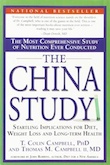 The China Study: The Most Comprehensive Study of Nutrition Ever Conducted And the Startling Implications for Diet, Weight Loss, And Long-term Health by T. Colin Campbell, 2006 The China Study: The Most Comprehensive Study of Nutrition Ever Conducted And the Startling Implications for Diet, Weight Loss, And Long-term Health by T. Colin Campbell, 2006
9) How To Value Yourself
Definition:"the sense of one's own value or worth as a person"
Source: The Free Dictionary
"the experience of being competent to cope with the basic challenges of life and being worthy of happiness."
Source: Nathaniel Branden's definition
"Self-esteem is a term used in psychology to reflect a person's overall emotional evaluation of his or her own worth. It is a judgment of oneself as well as an attitude toward the self."
Source: Wikipedia
Facts / Backgrounder:It is perhaps cynical to say that society is a giant conspiracy to get you to feel badly about yourself, but it wouldn't be completely inaccurate either. Advertisers make you feel badly so you'll buy their product, politicians make you feel incapable so you'll depend on their policies and programs, even your friends and acquaintances may seek to make you doubt yourself in order to seek an edge in a competition.
You can have all the knowledge and skills in the world, but they are meaningless if you do not feel personally empowered to use them; it's like owning a Lamborghini and not having a driver's license. It looks shiny in the driveway, but your not really getting any value out of it unless you take it out for a spin.
Valuing yourself is partially a matter of personal development, and partially a matter of choice.
How we think about ourselves is as much a matter of learning as anything else. If somebody tells you that you are worthless over and over, and if you do nothing to counteract that, then you will come to believe you are worthless, because that's how your neural connections will form. But if you repeat, and believe, and behave in such a way as to say to yourself over and over, I am valuable, then that's what you will come to believe.
What is it to value yourself? It's actually many things.
For example, it's the belief that you are good enough to have an opinion, have a voice, and have a say, that your contributions do matter. It's the belief that you are capable, that you can learn to do new things and to be creative. It is your ability to be independent, and to not rely on some particular person or institution for personal well-being, and autonomous, capable of making your own decisions and living your live in your own way.
All of these things are yours by right. But they will never be given to you. You have to take them, by actually believing in yourself (no matter what anyone says) and by actually being autonomous.
How-to:In order to value yourself, you need to feel you are worth valuing. In fact, you are worth valuing, but it often helps to prove it to yourself by attaining some objective, learning some skill, or earning some distinction. And in order to value yourself, you have to say "I am valuable."
You have to take charge of your own sense of self-worth. Do it every day.
Tell yourself that you are:
- smart,
- cool,
- strong,
- good
, and
- whatever else you want to be.
Say it out loud, in the morning - hidden in the noise of the shower, if need be, but say it.
Then, practice these attributes:
- Be smart by (say) solving a crossword puzzle.
- Be cool by making your own fashion statement.
- Be strong by doing something you said to yourself you were going to do.
- Be good by doing a good deed.
And every time you do it, remind yourself that you have, in fact, done it.
Suggested Readings / Videos: The Fountainhead by Ayn Rand, 1943 The Fountainhead by Ayn Rand, 1943
10) How To Live Meaningfully
Definition:"your lifetime dedication to some purpose or goal"
Source: Stephen Downes
"to live with purpose while creating something, whether physical, artistic or spiritual"
Source: Robin Good
Facts / Backgrounder:To live meaningfully is a combination of several things. It is:
a) your dedication to some purpose or goal.
b) your sense of appreciation and dedication to the "here and now".
c) the realization that your place in the world, your meaningfulness, is something you must create for yourself.
Too many people live for no reason at all.They seek to make more and more money, or they seek to make themselves famous, or to become powerful, and whether or not they attain these objectives, they find their lives empty and meaningless.
This is because they have confused means and ends - money, fame and power are things people seek in order to do what things worth doing. Not goals by themselves.
But what is then worth doing?
This is up to you to decide.
I have chosen to explore and share new ways and to communicate, learn, market and collaborate more effectively with others, but you may choose to master new ways of improving our health, to explore outer space, to grow self-sustainable communities, to do commerce with alternate currencies or to seek spiritual enlightenment.
If you don't decide what is worth doing, someone will decide for you, and then, at some point in your life you will realize that you haven't done what was really worth doing.
Whether you like it or not, what you are doing right now is the thing that you most want to do. Now you may be thinking, "No way! I'd rather be on Malibu Beach!" But if you really wanted to be on Malibu Beach, you'd be there. The reason you are not is because you have chosen other priorities in your life - to your family, to your job, to your country.
When you realize you have the power to choose what you are doing, you realize you have the power to choose the consequences. Which means that consequences - even bad consequences - are for the most part a matter of choice.
To live meaningfully is probably the hardest thing of all to learn, and the least one taught academically.
How-to:1) Spend some time, today, thinking about what is worth doing. You can change your mind tomorrow. But begin, at least, to guide yourself somewhere.
2) Live in the moment. It means having awareness and control of your thoughts.
3) Your thoughts have no power over you; the only thing that matters at all is this present moment. If you think about something - some hope, some failure, some fear - that thought cannot hurt you, and you choose how much or how little to trust that thought.
Suggested Readings / Videos: The Alchemist by Paulo Coelho, 1988 The Alchemist by Paulo Coelho, 1988
End of Part I
See Part II: What We Really Need To Learn To Be Successful In Life - Part II
And Part III: What You Really Need To Learn To Be Successful In Life - Part III
And Part IV: What You Really Need To Learn To Be Successful In Life - Part IV
And Part V: What You Really Need To Learn To Be Successful In Life - Part V
Original inspiration for this article, thanks to Stephen Downes, "Things You Really Need To Learn".Originally written and curated by Robin Good and first published on MasterNewMedia on Tuesday April 29nd 2014 as What We Really Need To Learn To Be Successful In Life.
Photo credits:How To Predict Consequences - Man with binoculars by ShutterstockHow To Read - Reading female student by ShutterstockHow To Distinguish Truth from Fiction - Red or blue pill by ShutterstockHow To Empathize - Touching fingers by ShutterstockHow To Be Creative - Collage by ShutterstockHow To Communicate - Modern road sign by ShutterstockHow To Learn - Father teaching his son by ShutterstockHow To Stay Healthy - Fresh salad leaves by ShutterstockHow To Value Yourself - Eye macro shot by ShutterstockHow To Live Meaningfully - Worker Hands by Shutterstock
How To Change The World With Your Social Likes
Today we can change the world every time we put our hand in our pocket reaching for money. 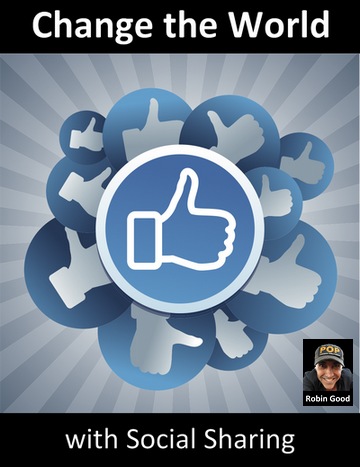
Photo credit: Social media concept by Shutterstock
If we carefully select who we give this money too, we can have a tangible effect on which companies do better, improve their reputation and those which are going to have a hard time doing it. But while in the real, physical world, those who have embraced this world-changing attitude, have had no problems in implementing it, few have realized that also in the online social sphere, we can personally boost and help tangibly those who we deem valuable of our attention and time. Online, in the social media spaces like Facebook or Twitter or Google+, we do not often put our hands in our pockets to reach for money to spend there. Yes, sometimes we do it, by using our Paypal or credit card account numbers to pay and vote for products and services we like and want. Most time on social media is not spent on making purchases, but on scanning and reading other people, news, personal stories, and discovering what they themselves have liked and shared. So, all of my contacts and friends are leeways into helping me discover, appreciate and pay attention to issues, things and people that I may have otherwise not noticed or seen at all. The unique and beautiful thing about social media, is that we do not have to buy, spend or invest any amount of real money to physically buy something to support our favorite change-agents represented by specific brands and people. We only need to proactively like and share their work.
The Deeper Value of Sharing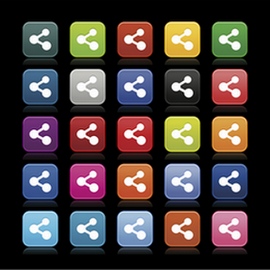 Think about it for a moment.
The click you have given to a story, an image or a video on Facebook that you really liked, is a way for that content to find more ways and more people who can be interested in it, especially if your network shares lots of your preferences and tastes.
But, when I think about it, I realize how conservative I am in liking and sharing other people's work.
I realize that I place my click only when the "thing" I see really fully resonates with me, to the point that I feel that I need to share it with others.
And that's how most people go about it too.
Perfectly normal.
The key point is that we want to "like" and "share" only what we think is really great, cool, useful or valuable, and especially what we think will make us look good in other people eyes.
But, this is not the only way.
I have realized that I can use my power of liking and sharing content to directly help, boost the reach and visibility of people and brands I like and that I think need to be successful, because they do something good.
In this light, I am not out there only to cast a high-quality vote exclusively on what I think it's really great, but I have at the same time the opportunity to pro-actively go out and help the people and small brands I want to see succeed by liking and sharing more of their contents. Not anymore with the exclusive idea that my "likes" and "shares" are for making me look good, but with the express conscious idea to give more visibility to those people and brands I want to see succeed. Think about it for a moment.
The click you have given to a story, an image or a video on Facebook that you really liked, is a way for that content to find more ways and more people who can be interested in it, especially if your network shares lots of your preferences and tastes.
But, when I think about it, I realize how conservative I am in liking and sharing other people's work.
I realize that I place my click only when the "thing" I see really fully resonates with me, to the point that I feel that I need to share it with others.
And that's how most people go about it too.
Perfectly normal.
The key point is that we want to "like" and "share" only what we think is really great, cool, useful or valuable, and especially what we think will make us look good in other people eyes.
But, this is not the only way.
I have realized that I can use my power of liking and sharing content to directly help, boost the reach and visibility of people and brands I like and that I think need to be successful, because they do something good.
In this light, I am not out there only to cast a high-quality vote exclusively on what I think it's really great, but I have at the same time the opportunity to pro-actively go out and help the people and small brands I want to see succeed by liking and sharing more of their contents. Not anymore with the exclusive idea that my "likes" and "shares" are for making me look good, but with the express conscious idea to give more visibility to those people and brands I want to see succeed.
Key Benefits
(of "liking" and "sharing" people and brands you support) If you are still wondering why it would be such a great idea to spend a few more "likes" and "shares" daily, not just on funny and gorgeous posts you run into, but also to willingly help, support, and give more visibility to those people and brands you deem can contribute to improve, in some way or other, the world you live in, here are some very good reasons to do it: If you are still wondering why it would be such a great idea to spend a few more "likes" and "shares" daily, not just on funny and gorgeous posts you run into, but also to willingly help, support, and give more visibility to those people and brands you deem can contribute to improve, in some way or other, the world you live in, here are some very good reasons to do it:
- Things don't change just by wishing so - or by sharing funny pics - unless you give support to those who see the world the same way you would like it to be, you are not really doing anything to change the world around you.
- By consciously giving visibility and credit to those people and brands that do the things you like and want to support, you are helping those companies and people be found by others who don't know them yet.
- The more people see ideas and options that they may have not considered seriously before, the more likely that a number of them will seriously consider to adopt them.
- To help new ideas and ways of doing succeed, there's presently nothing more cost-effective than sharing them on social media and having thousands of others extending and personalizing that message in tens of different ways.
- Realize the power of the Internet, by giving support, visibility and credit to the people and brands that are doing what you think is appropriate, and providing them with tangible returns (visibility, trust, positive word-of-mouth) without having to spend a dime for it.
How To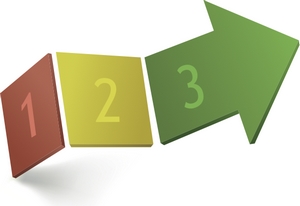 How do you go about doing this of proactive social support activity in your day-to-day online social media wanderings?
How can you make a difference without superficially clicking and sharing stuff that's not really good?
What changes you need to make to do this work?
Here's my advice: How do you go about doing this of proactive social support activity in your day-to-day online social media wanderings?
How can you make a difference without superficially clicking and sharing stuff that's not really good?
What changes you need to make to do this work?
Here's my advice:
- Like and share not just what makes you look good, but also what others, you want to support and help, have shared that is significant for you as well.
- Be aware that a "like", that takes you nothing and that exposes you minimally, can mean a lot to those who receive it (more visibility for their post, more "social proof", confidence boost).
- Seek pro-actively those people and brands you really like and who are doing something tangible to change or improve how things are. Find one or more items you are willing to "like" or "share" and do so.
- Realize that you have unrealized power in your hands. By helping in a sustained fashion those people and brands that have demonstrated to not be just about words and promises but who do the things you want to see, you are tangibly helping those people and brands succeed.
- Support in particular, those people and brands that declare publicly what they stand for, and what they are against, and who are transparent, about their business and partnerships, who are open to constructive criticism, and who are actively listening to their supporters.
ConclusionsTo change the world, one thinks, it is an ambitious task, too big and too hard to be carried out by anyone in a realistic fashion.
But, just as we have learned in recent years to vote the change we want through our wallets, by buying and supporting financially only those companies and organizations that match our ethics and ideals, so it is possible, to utilize the power of social media not just to read about the latest from your family and friends, but also to tangibly support and give help to those ideas, individuals and organizations that are already working in directions that can change the world in the way you would like it to be.
You don't need to be the change yourself, but you need at least to actively support those who impersonate it.
When browsing content on social media channels like Facebook, Twitter, LinkedIN or Google+, one can go beyond simply "liking" and "sharing" content that will look good on one's own profile feed, and utilise the opportunity offered by these social platforms to curate and give visibility to authors, ideas, people and brands that match the goals, ideals one wants to see realised.
By going beyond narcissistic social sharing, beyond being just mirrors and repeating antennas for the ideas and visuals that superficially resonate with us, one can utilise the power of the Internet to consciously help disseminate new ideas, and give tangible extra exposure to individuals and brands that are already doing something tangible to improve and realise your own very dreams.
It's all possible, if you help it grow.
See also: Design for Sharing - We Are What We Share
Originally written and curated by Robin Good and first published on MasterNewMedia on Tuesday April 22nd 2014 as How To Change The World With Your Social Likes.
Photo credits:The Deeper Value of Sharing - Share sign by ShutterstockKey Benefits - Plus icon by ShutterstockHow To - Step-by-step arrow by Shutterstock
The New Journalist Is An Information Startup
At the crossroad of journalism and entrepreneurship sits a new emerging profession, made up in good part by the skills of the classic journalist, in part by those of the researcher, of the librarian and of the new emerging content curator mixed in with those of the capable independent digital entrepreneur. 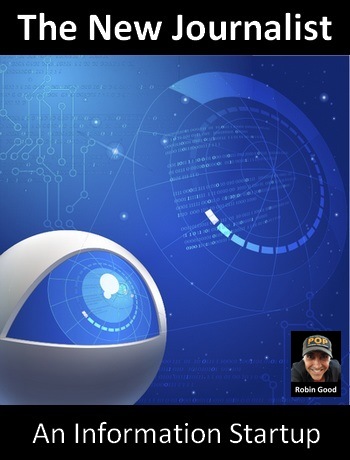
Photo credit: Digital world by Shutterstock
The information-entrepreneur is someone interested in creating ethical and highly reputable commercial services, tools and organizations that can augment, satisfy and fulfill humans deep or specialty interests within a specific information area.
Information startups have little or nothing to do with what is generally referred to as info-preneurship. The infopreneur has become the stereotype for who sells informations (of whatever quality level) to make money online. Thus, the field, the people who promote it and the information you can find online by searching for this topic, is not of high quality and is specifically driven by a "sell as much as possible, no matter how you do it", making-money attitude. But info-marketers and info-preneurs, may have been unaware precursors of a new breed of very serious information entrepreneurs that are eager to develop and put together useful and very targeted professional information services. Here all the details:
Information Entrepreneurs Most people think of a startup as a new digital venture, often financed by venture capital, which, by way of custom engineered software develops a service, solution or product to be offered and subscribed to / sold online.
And, indeed, the vast majority of today startups match pretty closely the above definition.
Tech startups are often built on small teams, made up mostly by tech people with refined coding, programming, interface design and prototyping skills.
It's these startuppers ability, their already acquired coding skills and their awareness of what can be potentially done, that motivates them to dive into creating a startup. They are aware that they have enough know-how, skills and personal confidence to create "something" that works across all computers and devices.
But what to do with these assets is much less clear to these startups, as they are driven more by profit opportunities than by a vision of what they want to do, realize or change in the world around them.
These startups are not originally motivated by a specific idea or mission they want to realize. They are more intrigued by the idea of building "something" and getting as much money as possible for doing it, in the shortest possible time.
On the other hand most entrepreneurs who have instead little coding and programming abilities feel that their competence and skills are not adequate to jump onto the startuppers train and to build a digital service or product that can be sustainable.
But is it really so?
Do I really need to know how to code to build a successful digital startup?
Are there other types of startups that could be created, not based exclusively on the ability to code programs or algorithms but rather on the value that can be created by organizing in very effective ways, large swaths of information within very specific interest areas, and for very targeted groups of people and applications?
My answer is yes.
But differently than "tech startups", who generally focus and see themselves as coders of new apps and services, these other startups are conceived with a specific goal in mind: the gathering and the organizing of information in a very specific area or for a very specific application / tribe (group of people with a common interest).
For ease of communication, and to have a way to reference them separately from the typical tech startup, I would like to reference these new companies as "info startups". Most people think of a startup as a new digital venture, often financed by venture capital, which, by way of custom engineered software develops a service, solution or product to be offered and subscribed to / sold online.
And, indeed, the vast majority of today startups match pretty closely the above definition.
Tech startups are often built on small teams, made up mostly by tech people with refined coding, programming, interface design and prototyping skills.
It's these startuppers ability, their already acquired coding skills and their awareness of what can be potentially done, that motivates them to dive into creating a startup. They are aware that they have enough know-how, skills and personal confidence to create "something" that works across all computers and devices.
But what to do with these assets is much less clear to these startups, as they are driven more by profit opportunities than by a vision of what they want to do, realize or change in the world around them.
These startups are not originally motivated by a specific idea or mission they want to realize. They are more intrigued by the idea of building "something" and getting as much money as possible for doing it, in the shortest possible time.
On the other hand most entrepreneurs who have instead little coding and programming abilities feel that their competence and skills are not adequate to jump onto the startuppers train and to build a digital service or product that can be sustainable.
But is it really so?
Do I really need to know how to code to build a successful digital startup?
Are there other types of startups that could be created, not based exclusively on the ability to code programs or algorithms but rather on the value that can be created by organizing in very effective ways, large swaths of information within very specific interest areas, and for very targeted groups of people and applications?
My answer is yes.
But differently than "tech startups", who generally focus and see themselves as coders of new apps and services, these other startups are conceived with a specific goal in mind: the gathering and the organizing of information in a very specific area or for a very specific application / tribe (group of people with a common interest).
For ease of communication, and to have a way to reference them separately from the typical tech startup, I would like to reference these new companies as "info startups".
What Is Exactly an Information Startup An information startup is a developing new company focused on creating unique value by organizing specialty, sector-specific information for a specific audience or application.
That is, instead of being a company concentrated on creating a physical tool, a device, a program, web app or software application designed to help you do something, an information-startup is a new company focusing on organizing a specific set of information resources into a service that can save time and money to those using it.
Some examples of what an information-startup could effectively do: An information startup is a developing new company focused on creating unique value by organizing specialty, sector-specific information for a specific audience or application.
That is, instead of being a company concentrated on creating a physical tool, a device, a program, web app or software application designed to help you do something, an information-startup is a new company focusing on organizing a specific set of information resources into a service that can save time and money to those using it.
Some examples of what an information-startup could effectively do:
- Evaluate and compare different products / services. Help to find best, most fitting solution for a specific problem / interest / issue
- Showcase the full spectrum of products / services available in a specific market / industry / area
- Organize and make it easy to find specialty resources, tools in a certain sector
- Catalog and organize people in a certain sector
- Illustrate, explain, what is otherwise difficult to understand / learn
- Support learning about a specific topic
- Investigate, on-demand, specific issues that affects society or selected groups of people
- Collect and organize success stories on a specific topic
- Create templates, checklists that facilitate and guide the execution of specific tasks
- Gather best examples of products, tools or solutions that solve a specific problem / interest / issue
Differences between Info Startup and Tech Startup
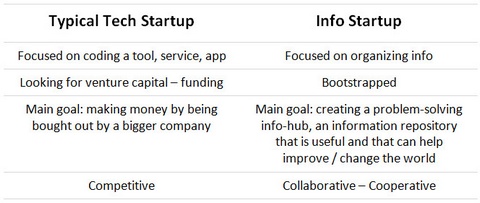
This comparative list of traits is consciously provocatory.
I am aware that not all tech startups have the key traits I attribute to them. There are many tech startups who are bootstrapped, who have started from the genuine idea of solving a problem and who care at least as much about contributing something of value than about how much money they are going to make.
Still, most of the startup articles, events, newsletters and people that I know have very strong affinity with the traits listed in the left column (typical tech startup). For what I can see, the vast majority have not even ever questioned their idea of startup, nor have ever seriously considered the possibility of alternatives such as the one I have been describing here.
The fact that many of these people have a strong technical background and have their core skills and credentials built around technical expertise may somehow explain their natural tendency to look at how to create a new engine more than at how to solve a real problem in a way that is simple for others to use.
On the other hand, founders of "info startups" are much less likely to be engineers, skilled coders and programmers, and include individuals who have a much more humanistic and socially-motivated approach to life and business.
Key Traits of Information Startup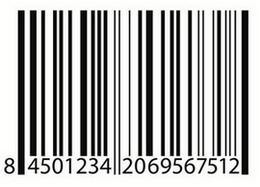 Most people presented for the first time with the idea of an information-startup have a hard-time taking this idea seriously as much as conceiving any way of making such type of company economically sustainable.
The reason for this, is that when talking about an information-based business we naturally default to think about the typical news and information businesses that are normally associated with newspapers and magazines of different kinds. And given the crisis that these information publishing organizations have seen in the last decade, both in terms of readership as well as in terms of revenues, it is only normal to question how would it be possible for an organization that wants to survive by organizing information to effectively do so.
If we were in fact to build more information-based organizations like the typical online newspaper or magazine, we would be surely digging our grave with our own hands.
To create a sustainable information-based startup, or what I would call a new type of entrepreneurial journalistic venture, the key ingredients that I deem absolutely indispensable are: Most people presented for the first time with the idea of an information-startup have a hard-time taking this idea seriously as much as conceiving any way of making such type of company economically sustainable.
The reason for this, is that when talking about an information-based business we naturally default to think about the typical news and information businesses that are normally associated with newspapers and magazines of different kinds. And given the crisis that these information publishing organizations have seen in the last decade, both in terms of readership as well as in terms of revenues, it is only normal to question how would it be possible for an organization that wants to survive by organizing information to effectively do so.
If we were in fact to build more information-based organizations like the typical online newspaper or magazine, we would be surely digging our grave with our own hands.
To create a sustainable information-based startup, or what I would call a new type of entrepreneurial journalistic venture, the key ingredients that I deem absolutely indispensable are:
- Vertical, very specific focus
This is where the value is: high specificity driven by use and application
- High reputation, credibility
Nothing to do with high follower counts, traffic or other similar indicators
based on testimonials from reputable individuals
- Experience, competence, credits
Verifiable experience, track record, achievements, published works
- Organization - Ease of access
Intuitive content structure and navigation
- Completeness
Comprehensiveness
- Replicability
Opportunity to copy, download, replicate and re-use data
- Customization
Ability to provide users with options to customize views, data, results
to their specific needs
- Real-Time
Multiple channels updates - via email newsletter, alerts, RSS, SMS, etc.
- Advice - Opinion
Strong viewpoint - useful advice and opinion
- Information Designed
Fanatically curated for maximum legibility and comprehension
- Experience Designed
Utilizes innovative and effective new content delivery formats
moves beyond linear text page
- Conversational
Crowd-open - open to contributions and dialogue with audience
- Transparent
Full disclosure of interests, partnerships and other critical influencing factors and bias
- Connected
Capable of detecting and interpreting trends and relevant info from other fields
Examples of Information Startups Here is a brief list of companies that have chosen to focus on organizing and providing better access to a specific set of information resources, satisfying a very specific need.
All of these companies are characterized by these traits: Here is a brief list of companies that have chosen to focus on organizing and providing better access to a specific set of information resources, satisfying a very specific need.
All of these companies are characterized by these traits:
a) company/service based on organizing some existing information, news or resources not on developing a special technology, software or app
b) has paid / premium offering or other forms of revenue-making
c) they are successful at doing what they do
- Lynda
Online video tutorials and training
BM: subscriptions, direct sales
- Daily Dish
Curated stories by Andrew Sullivan
BM: paid subscriptions
- Techmeme (and sister sites Mediagazer, WeSmirch, Memeorandum)
Curated topical newshub on silicon valley industry
BM: sponsored stories
- Crunchbase
Free editable database of technology startups, companies, people, and investors
BM: advertising
- Business Model Canvas
Strategic analysis and simulation of variables at play in defining a startup biz model
BM: subscriptions, book, workshops
- Trendwatching
Understanding the new consumer
BM: premium reports
- Teaching Sells
Web course on building, marketing, and running a learning-based online business
BM: subscriptions
- Online Meeting Software Review
Web-conferencing comparing service
BM: subscriptions
- User Onboarding
Curated best practices for digital product adoption
BM: N/A yet
- Happy Inbox
Discover great newsletters
BM: N/A yet
- Fest300
The world best festivals
BM: co-promotion, pay-to-be-included/featured
- Quicklets
Expert sidekick to the world's most popular books
BM: direct sales
- EBSCO Collections
Find the perfect collection of subject-specific titles for your library
- Feedmyapp, BetaList
Select and review new interesting startups
BM: advertising, pay-to-be-included/featured
- SmartBrief
Industry specific curated daily news
BM: advertising, sponsorships
- ReallyGoodEmails
A curated collection of best-examples of email messages
BM: sponsorship
- AppSumo
Special product offers for business startups
BM: direct sales of third-party products
- TrendHunter
Find better ideas faster
BM: advertising, reports, workshops
- Free-Codecs
Download codecs and multimedia tools
BM: advertising
- OldVersion
Old versions of popular software tools
BM: advertising
- International Journalism Festival - Perugia
Past, present and future of news
BM: sponsorships, crowdfunding
- TED Events
Ideas worth spreading
BM: event tickets, sponsorships
ConclusionsTechnology startups are generally characterized by new small companies trying to code and app or service, while looking for venture capital and for the fastest opportunity to get out of the way to sell their baby to a richer family.
While there are many shades of such tech startups, the great majority of these seem to be characterized by a strong pool of tech skills, great desire and enthusiasm to create something, and the motivating idea of being able to make lots of money by selling out their startup to a big company.
But there are also other options, especially for those who are not:
1. highly tech skilled
2. code programming experts
3. after the money as their first objective
But who are instead strongly characterized by:
a) strong competence / experience / interest for a specific sector
b) research, vetting (crap detection), evaluation skills
c) writing and presentation abilities
d) interest to share - help others - create something truly useful
For these individuals, journalists or subject-matter experts of some kind, there is indeed a great opportunity to create something of value that is quite different from what we have seen so far.
The new space is simply defined by anyone who wants to comprehensively organize and curate the most valuable information resources on a specific topic, and is characterized by organizations that are capable of building a sustainable / profitable business while creating something that has not just market, but also social value of some kind.
Originally written and curated by Robin Good and first published on MasterNewMedia on Tuesday April 15th 2014 as The New Journalist Is An Information Startup.
Photo credits:Information Entrepreneurs - Businesswoman by ShutterstockWhat Is Exactly an Info Startup - X-ray hand by ShutterstockDifferences between Info and Tech Startup - 3D symbol by ShutterstockKey Traits of Info Startup - Bar code by ShutterstockExamples of Info Startups - Future technology by Shutterstock
|
|
|
|
Who's Online |
|
Abbiamo 1 visitatore online |
|
Statistiche |
|
Visitatori: 4045513
|
Thursday 27 November 2025
|

 News Feeds
News Feeds

 News Feeds
News Feeds